#and i believe it's because china has a very old and rich culture too
Explore tagged Tumblr posts
Text
Remembering the opening ceremony of athens 2004 💙🤍💙🤍










And because i know many of you were babies then (some even not born 😅) here is a link to watch the full ceremony. I promise it's worth it 💖💖
youtube
#olympics#the artistryyyyy#anyway just some of my fave pics of that night#it is not because i'm greek that i say best opening ceremony EVER#it's a fact#and it's logical because greece is their home there is so much history#and we did it stunningly#beijing 2008 was the next best check that out too#and i believe it's because china has a very old and rich culture too#and both countries didn't just make a spectacle for television
277 notes
·
View notes
Text
What is F(L)OSS about really? (Preview #1)
youtube
What is licensing, ownership and rights about?
I often describe such throughout the software domain but can easily be applied almost everywhere in society, like in hardware and culture. If I am not mistaken, it pertains to what you actually is your own, either it is home, furniture, computer hardware, software, artistic media, equipment, et cetera. Licensing is similar but has a more autonomous / shared ownership meaning applied.
And the reason why I believe that matters so much is because while the majority (of the human bell curve of demographics*) oftentimes ignore and brush off their personal agency on the wider scale of human planetary affairs, that attitude of distributing their energy & efforts towards current grand managerial bodies like big corporations and big governments is a quite short-sighted perspective and has a quite negative impact in our present day and potential future(s). It is not exclusively negative one-sided story but still, profiteers are not providing enough value for what you invest into their zone of control, monetary or otherwise... and that is very concerning considering the current global society context and the decisions made by such staff of managers & "drones".
The non-profit organization that is Creative Commons as well as my provided hyperlinks across this article should give you a decent insight into matters...
Spectrum of licensing paradigms

Copyright, the large landlords & proprietary ownership models pertain to the old Liberalism way of thinking (at least if we are to follow it under late-stage capitalism, liberalism and the philosophy of contemporary feudal US law). Not always bad and could really be better implemented as seen in the centuries prior to now.
(I mean, when things were less... structured, competitive, authoritative and rigid in the West and elsewhere, the autonomy and liberties allowed by such a paradigm of a abundance of workforce & income was nice to have and use, but not without some costs even then. Compared to now where things also have costs but as those grew for the low & middle classes and were not compensated by such rigid old models by the aging rich baby-boomers population yet, which is a shame considering all sides really could use a update / upgrade in their to persist in profits and long-term positive legacy.)
But as of today, it is so often misused and taken to extremely abusive extents as shown by the actions of major corporations going all over with massive-scale spying (look at Oracle data tracking record of like 5 billion people and growing), malevolent compliance (look at how both Apple and Microsoft comply heavily with US governmental guidelines for data collection, either by on-chip spyware or otherwise...), critical citizen censorship (like in Continental China, Russia and even the US of A as demonstrated by Edward Snowden's), corporate cooperation & corporative law-craft evils (Valve & Nintendo implicitly agreeing to shutdown Dolphin emulators on Steam, the way Microsoft-Mojang Minecraft falls apart over 1.19 update matters and how major corporations overall back each other up knowing their days are counted), vendor lock-ins, big tech oligopolies and marketshare dominions, expensive prices for very low value provided even for corporate agencies, too much managerial staff oversight control on decisions over workers, failing advertising economy, low-security bottlenecks with malware + botnets (thanks for the "infinite" loop of "security" with leaks, major failures & bulk password breakers trade market against consumers being traded against the will by black hat hackers & operatives that get paid by every irresponsible hidden or not governing bodies autonomously in lawful impunity, that unofficial though-police & cultural choices fails the potential of us all and will accelerate much the descent to further of a societal collapse that is entirely unnecessary if we are to rise to the stars on-time for the dream we were sold to in life), overstaffing & underpay (Amazon & every other mainline corporation abusing his employees for quicker short-term profit, paying very often low-as-in-slavery wages and Amazon taking full control of their employees' communication channels for drone promotion), menial purpose-less tasks and walled garden policies (looking at Apple's overpriced options being less competitive than the value and price paid for such, as well as the hopefully not soon Microsoft going onto such a exclusivity market that they alienate the best in their customer base into migrating away to non-exclusive environments like Linux), along many other situations / issues as revealed by information leaks & literal living in this global culture, both in explicit and implicit forms.
Copyleft, open source, free culture and library economy are the basics of our best bet to solve our current state of affairs, at least compared to what late-stage capitalists offer to us. Not the best thing forever more, but something quite more competitive and more appealing both short-term & long-term to the other corner in the licensing spectrum for the next few centuries, (or until the copyright catches up in given value to the customer and ethics to the lower classes fast but that's very unlikely due to the current rich folks' greed & ideology...) After all, today's enthusiasts, indie artists and modders are tomorrow developers, maintainers and architects.
Permissive licenses, public domain, and third-way alternatives?
~
Nuances on licensing
~
I have a fairly specific example in mind over one thing we should do better for despite the prejudices ill-fully distributed concerning AIs androids and other smart instruments. You see, as a sapient-kind that most likely desires progress and growth for yourself and potentially other individuals, we have a strong responsibility to cater and take care of both ourselves and every single thing we have agency over (to an agreeable extent ofc, not zealous over it) for both autonomous GAI agents and our current clade / species of humans alike... (there are likely aliens and further future humans species awaiting to be born from our efforts this century, unless the meta history is exclusively a job for some other elder sapient species coming before ourselves, which is extremely unlikely)
Seeing how the current mainstream APIs (even OpenAI and Stable Diffusion's) and datasets available for generative AIs, machine leaning models and other such autonomous agents are quite unethical / illegally acquired and heavily biased against a few core values we share instead of promoting the better parts of our psyche and species, I wanted to point out and encourage the independent & humanist re-developments of such technical promesses before the time when we might lose fully those freedoms / rights to develop the very basics of such future-oriented infrastructure.
After all, if we desire to make sure of both growth, progress, autonomy and abundance for us and our species now and onwards, we need to make sure that we get the rightful tools for stellar expansion on-time. And among those Quality-of-Life things that will help us by far for such a purpose and more will be a benevolent GAI (modular?) system. And that takes initial efforts and gentle caring humane guidance to show and bias such a GAI module into the brighter futures that we aim for really. Also, we should not screw up the future of our species (and other sapients') seeing how grand, and magnificent those futures are really headed towards. (See Stellaris, Isaac Arthur, melodysheep and Kurzgesagt)
That being said, I design my constructed world for multiple purposes including to emulate / simulate history, learn & develop my skills, advocate for my worldview and show to each and everyone why how and what matters for the prosperity of the whole species.
youtube
~?
youtube
Of course, here is the not-so-surprising cliffhanger twist ending of how all of it relates to (Woodrow) Wilsonism, global politics, socio-economics & the last half-millenium of historical patterns...
But that's for a later article. So take care and farewell!
0 notes
Text
a lil guide to the Fire Nation for the ATLA fic writers out there
(aka. a no means exhaustive primer on east asia by an asian person)


This is a guide for fic writers want to write a canon-era story set in the Fire Nation, or featuring Fire Nation characters. A quick little primer on the tiny details of everyday life that you might not think about, but certainly stuff that would make me, an asian person, wince if I were to encounter it. BRUSHES, not quills. CHOPSTICKS, not forks.
(note #1: this was partly inspired by a chat with @elilim)
(note: #2: I originally intended it for zukka fic writers before realizing that other writers might find it useful. so apologies for a slight Zuko-bias for that reason)
(note #3: this is all stuff i was thinking about when writing firebender’s guide, in case anyone was wondering)
1. CLOTHING
Okay, I think the most straightforward way to describe what everyone’s wearing most of the time is “tunic”. They’re all just...tunics of different colours and varieties. Later when Zuko’s the Fire Lord he wears robes. The show provides a better visual guide than I could, here are a few notes to keep in mind:
a) Japanese people wear their collars LEFT crossed over RIGHT
I don’t think this would come up in writing as much as it would in art, but it’s considered bad luck to do it the wrong way because that’s only for dead people. Let my boy Zuko demonstrate:
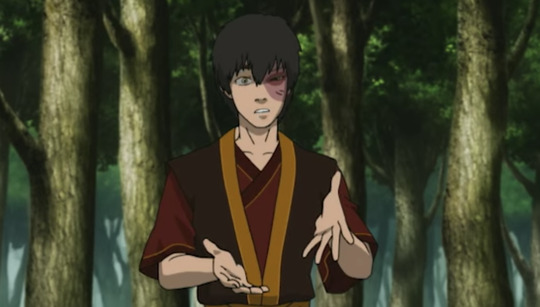
b) There are no buttons
This is picky, but Wikipedia says “Functional buttons with buttonholes for fastening or closing clothes appeared first in Germany in the 13th century.[6] They soon became widespread with the rise of snug-fitting garments in 13th- and 14th-century Europe.” I kinda believe it. If you look closely, characters’ clothes are always tied together or wrapped in some way with a belt. If there are fasteners, they’re braided frog closures that go into a little loop, like the qipao-style dresses women wear in Ba Sing Se, or Zuko’s casual prince’s clothes in the topmost image. Anyways, I don’t think Zuko or Azula or the Gaang would technically button or unbutton anything when they’re changing clothes. Clothing is designed to be tied, not buttoned.
[so much more under cut]
c) This isn’t a real rule, but there’s something called koromogae, or the seasonal changing of clothing in Japan.
This is something I learned when I was writing firebender’s guide, and I just liked the fun detail about there being a strict calendar for when to wear something. I liked the idea of someone like Zuko, who actually spent most of his formative years outside of the Fire Nation, coming home and just suffering mutely through the summer heat because upper class etiquette says no changing into cooler clothes until August 15.
From My Asakusa:
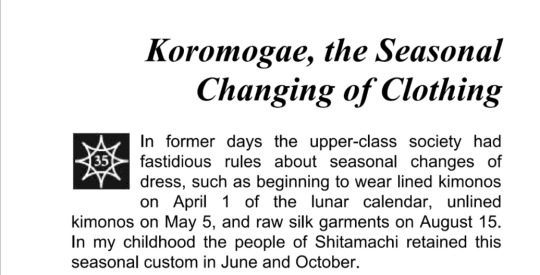
And this website:
Generally, people change from thick, heavy, dark-coloured clothes for winter to thin, lighter, bright-coloured clothes for spring and summer. In traditional Japanese culture, particularly in formal settings such as tea ceremony, it is important to acknowledge the changes of seasons—in such circumstances, not only the patterns and colours of the kimono that are worn but also the utensils and furniture that are used are required to change. By changing their clothing, people notice and appreciate the change of seasons. [Japan Foundation]
Here are some visual guides from the official creators for clothes: (notice how it’s pretty much always left over right)
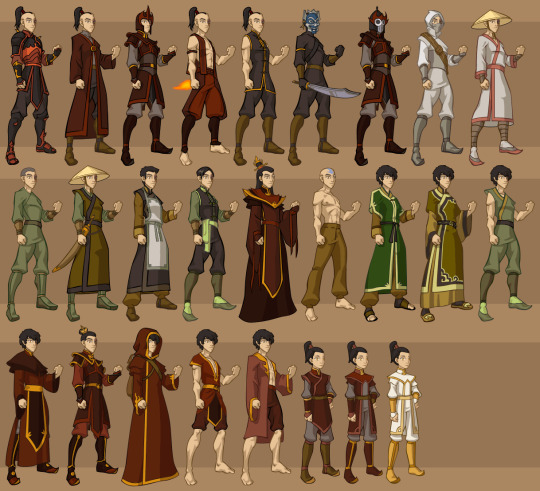
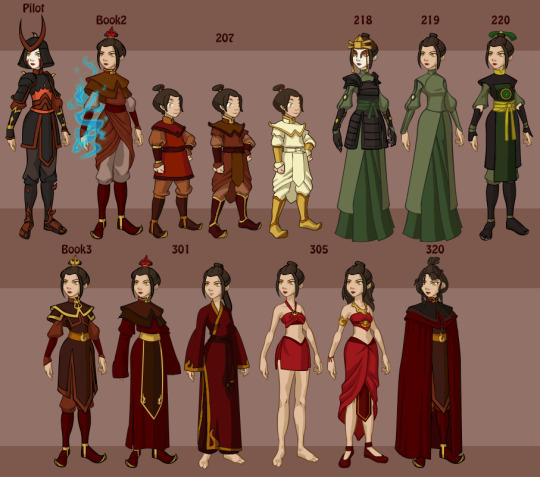
2.FOOD AND EATING
a) Traditional cuisine
It seems like the most common foods in canon are Fire Flakes and meat, to the point where poor Aang had to eat lettuce out of the garbage at some point.
HOWEVER, the Fire Nation seems to basically a big subtropical archipelago, so I would guess that seafood and rice are common. If you want to write about characters eating, a. quick google for “traditional japanese cuisine” would help you come up with a menu really quickly.
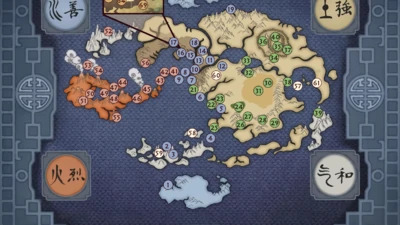
Wikipedia says:
The traditional cuisine of Japan, washoku (和食), lit. "Japanese eating" (or kappō (ja:割烹)), is based on rice with miso soup and other dishes; there is an emphasis on seasonal ingredients. Side dishes often consist of fish, pickled vegetables, and vegetables cooked in broth. Seafood is common, often grilled, but also served raw as sashimi or in sushi.
But before we get too serious, at one point the Gaang eats a “smoked sea slug” (Sokka’s Master)
Oh ATLA, never stop being you.
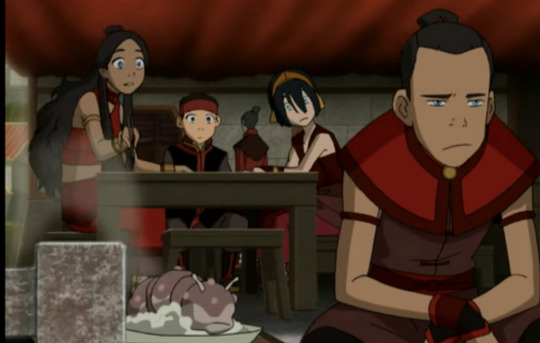
b) Utensils
One thing to keep in mind is chopstick etiquette. Someone like Zuko or Toph, for instance, would have completely internalized all of these.
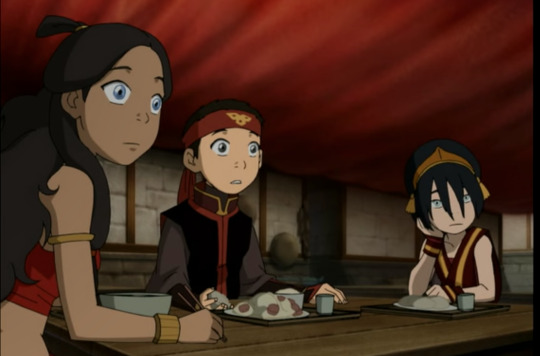
Another thing is that there are no glasses. Cups and bowls are made of ceramic or clay. Let the Gaang show you:
And another note: characters won’t eat “bread” in the European sense, ie. a baked lump of dough. Steamed buns, yes. Fried pancakes made from batter, yes. Flatbreads, okay I’ll give it a pass. Rice or noodles should be the most common carbs of choice.
3.ETIQUETTE
“In the homeland, we bow to our elders” - angry schoolmistress in The Headband.
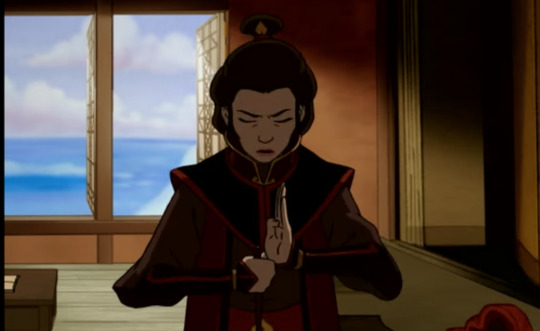
Japan Guide has a list of etiquette rules for visiting Japan, which is interesting but not too necessary to read. In general, based on what The Headband tells us, Fire Nation characters would have been raised with a strong nationalist curriculum that values communal contribution over individualist expression. Even someone like Zuko, who openly rebels against that, probably couldn’t help but be affected by it. In general the Fire Nation seems to have an East Asian-ish set of values. It’s patriarchal, all the positions of authority are filled by men; there seems to be a strong emphasis on patriotism; there’s a sense of diffidence and respect towards one’s elders; and finally, there’s an emphasis on “knowing” one’s place in society and fitting into what’s expected of oneself.
I don’t really know how to describe it, but in China and Japan I sometimes feel like there’s rules for everything, and even people born and raised there acknowledge it could be stifling at times. You could go down a rabbit hole researching points of etiquette (for instance, rules on who has to sit where in group dinners...), but to me the most important thing is acknowledging that Fire Nation has a rigid system of etiquette, and also, they’re an imperialist power who’s pretty prejudiced against foreigners. Poor Aang/Kuzon gets called “mannerless colony slob” just for being slow on the bowing action (!!!)
(in firebender’s guide I had a lot of fun imagining the stupid microaggressions Ambassador Sokka has to face in the Fire Nation, so obviously I’m just biased)
4.WRITING AND DESKS
Characters would probably write on paper, with a calligraphy brush. Not quills or pens -- a brush. Technically, old Japanese and Chinese texts should be written top to bottom, right to left, but the show itself doesn’t do this, so I think you’re fine.
One fun thing about traditional calligraphy is that you don’t use bottled ink. You have something called an ink stone, and then you grind your ink yourself by rubbing the ink stone in a special little dish with a bit of water. In my (very few) encounters with this stuff in the calligraphy lessons of my youth, the ink stones can be plain or have beautiful designs on the side. It looks something like this:
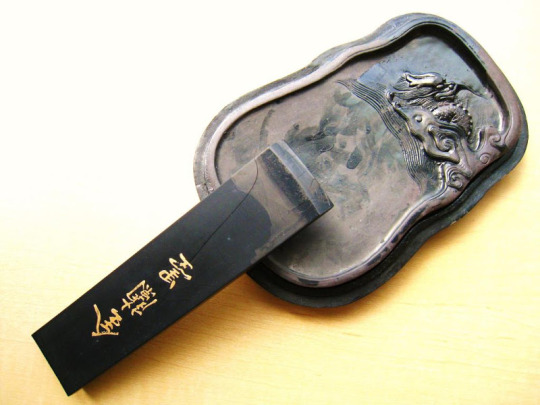

ATLA is an East Asian-ish universe, so characters are likely to be kneeling at a table, not sitting. To demonstrate, here’s my boy Sokka doing his famous rainbow at Piandao’s:
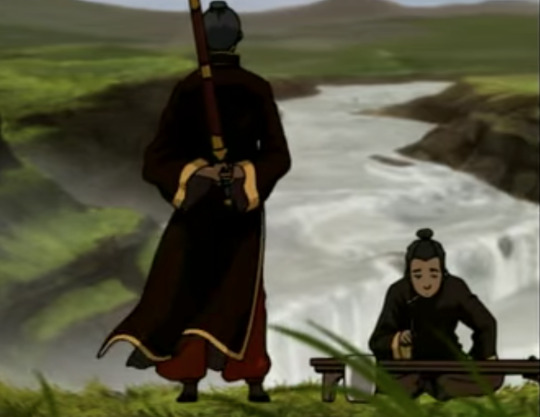
and here’s the war chamber meeting when Zuko speaks out against a general’s plans to sacrifice some soldiers:
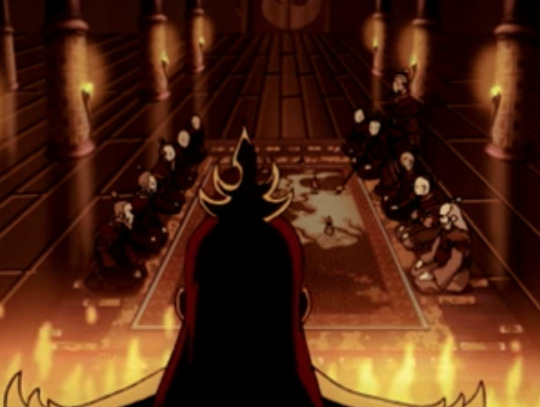
THERE ARE EXCEPTIONS: This is Zuko’s cute little setup when he’s writing his goodbye letter to Mai. In this case he’s writing in a chair and table. It’s possible that some furniture items, like a sitting desk and a bed in a bedframe (not a bedroll or futon) are special royal palace features. Normally in a private setting we see characters sitting on the ground or on a slightly elevated platform with a low table. Maybe Caldera is just different? Or rich people are just different: the Bei Fongs also have a sit-down dining table + chair setup.
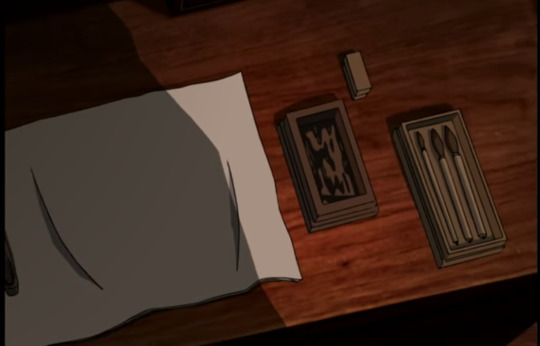
(That little rectangular box is his ink dish!!)

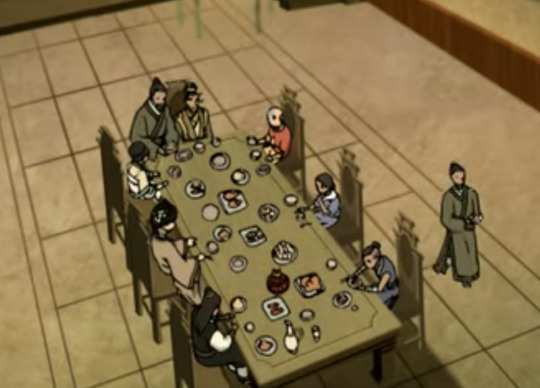
5.A NOTE ON GENERAL CULTURE
It’s worth talking about a few general points of East Asian culture. I can’t claim to speak for ALL of Asia, and I don’t think I should. But I do think ATLA fic writers who want to set something in the Fire Nation should take a few moments to at least skim the wiki pages for filial piety and Nihonjinron (literally, "theories/discussions about the Japanese"). There’s a certain...vibe to...asianness... that I’m not sure I can explain without like, a doctorate degree in sociology.
It’s a bit like gender, I guess. There’s no definitive checklist to what is a woman and what is a man, and we can argue that gender is performative, that it’s a construct, but at the end of the day gender is still (tragically) real in the sense that it still shapes people and affects how we walk and talk and dress and think. Nationality is the same. Obviously, the Fire Nation is a made up place in a made up show, but out of respect to the cultures that inspired it, I do think it’s worth familiarizing yourself with some of these cultures’ codes and values.
Also, ahem, if I can direct you to war crimes in the Japan’s colonial empire. Again, worth remembering that the Fire Nation was an imperalist colonizer too.
I might do a continuation of this post and talk through my more abstract takes about Fire Nation culture - Is Zuko an example of filial piety gone right or filial piety gone wrong? Why I think Zuko’s flashbacks are like, at least part teenage melodrama bullshit (the reason is son preference), how someone like Sokka might be treated once he’s openly Water Tribe in the Fire Nation (probably with racism...), specific aspects of asian homophobia and racism, etc. We’ll see.
This is not a definitive guide. Comments and critique welcome.
If you think there’s a factual mistake, PLEASE hop in my asks and let me know. I also think there’s a huge blind spot in ATLA for South and Southeast Asian representation, so I acknowledge that I can’t speak for all Asians, and there is no such thing as a “pan-asian” identity.
If there’s something else you’re curious about, I’m not a historian or anything, but I like research. Ask me and I’ll try to answer the best I can.
And oh, one last thing, this is how I do research when I wrote firebender’s guide, in case anyone’s interested in learning more (LINK)
3K notes
·
View notes
Text
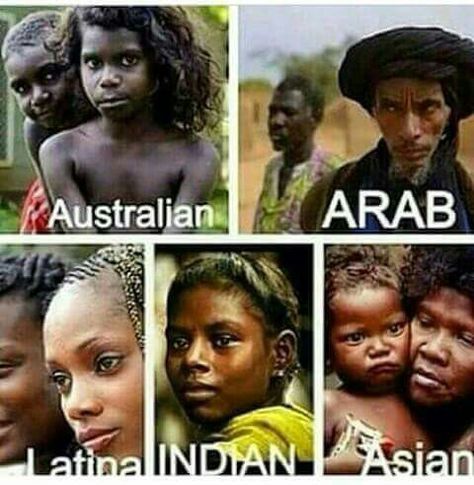
THE TRUTH AND SHAKA ZULU WILL KILL YOU
In a once-popular commercial for Calgon detergent in the 1970s, a curious housewife probes the Chinese owner of the local laundry for the answer to one of the world’s eternal mysteries: “How do you get shirts so clean, Mr. Lee?” After peering over his shoulder (so as to be sure that his not-so-discreet wife isn’t standing near) the man turns back around, raises a finger to his lips and says through a smile, “Ancient Chinese secret!”
While the answer to the question posed to the laundry owner by the woman was a closely guarded secret — one that his sweet, no-nonsense wife happily ruined — it was neither ancient nor even Chinese in origin. But the TV spot famously tapped into one of the most enduring legends about the country whose Ming Dynasty rulers had a 16-to-26 foot wall built around it: the age-old traditions of secrecy.
And, like Vegas, what happened in China very often stayed in China, just get the hell out of Alkebulan!!! But if you insist on staying, you and your barbarian invader horde of Ghengis Khan, wannabe warlords can take that beatdown like Hirihito of Japan. You can indulge in Alkebulan's rich resources for a season or get on a junk boat and go back to China and rebuild your own country. If you stay in the Motherland you'll perish🖕🏿🖕🏿🖕🏿🖕🏿. As the saying goes, s**t happens. Wash ya ass. Please, continue reading… my screwed up mind !!!
Take the Black Chinese [Moabites] who once made up the entire population of China prior to Esau's attempt at reclaiming the birthright God decreed would be Jacob's while in the womb through forced miscegenation "Raping of indigenous women." Do not be confused or mislead by this post. My research was sketchy to say the least. The portion of the population before China’s modern era does not register any indigenous Moabites, for example. The fact that you’ve never heard of them proves the point. Here comes the BS. But don’t worry. You’re not alone. China has some 1.3 billion people and nearly all are just as in the dark about them. Well, either that or a billion people all swore to never-ever-never air any [ahem] ‘clean laundry’ about black folks formerly having a place in China’s allegedly homogeneous society. That's a bunch of made up monkey s**t. Frankly, even an ancient culture with the bragging rights to the longest continually recorded history, another myth, is bound to miss a few things like a heart, and some effing genomes. The former presence — up until sometime in the 20th century — of Black people in pre-modern China is one of them. Fortunately, though, old photos taken throughout China around the advent of photography can help us to fill in today some of what the historians missed on purpose. I can't believe I'm posting this. 👎🏿👎🏿👎🏿👎🏿 China’s Qing Dynasty, established by the Manchu people who ruled from 1644–1912, is described as having been a vast multicultural empire. But it appears multicultural could also be a more pleasant euphemism for multiracial. You people are like dogs, stop eating them?! Nothing illustrates this better than the Black and white photos taken by visitors from Europe in the mid-to-late 1800s. Really?!! John Thomson, an Irish photographer was one of the first to capture images that reveal a surprisingly more diverse makeup of then-contemporary China. In one of the most stunning photos taken by Thomson displayed above, six women dine together in a courtyard. Captioned “Manchu ladies at a meal,” the picture was taken in 1869 in the city of Peking (now Beijing). Seated at the center of the photo are two women: on the right sits a typical high class Manchu and on the left sits a smiling Black woman — who could easily pass as the mother of the RZA, the GZA, Ol’ Dirty Bastard, or any other member of the Wu-Tang Clan.
Apart from the physical differences in the women (including the two who were likely seated, but stood for the picture), what’s also remarkable is that when Thomson writes about them, he makes no distinctions — though there were both racial and class differences; some of them were most assuredly attendants or maids. But in the view of Thomson, they were all simply Manchu ladies sharing a meal on a day when he sought interesting subjects to photograph. I saw the photographs. The darker ones were inherently claimed to be lower case workers or servants, while the ones who looked like Lucy Liu were considered affluent, and well off. These racial disparities that evolved from hell are a sad reminder to a wound that won't stop bleeding because of man's inability to stop giving in to his base emotions. I plead cray cray, and insanity. Jacob, they would rather burn in hell for an eternity than let us live in peace for a day. God is coming back for Israel not the Christian Church that has been corrupted by the Evangelical, right wing, nut jobs.
1 Maccabees 3:48
And laid open the book of the law, wherein the heathen had sought to paint the likeness of their images.
If you study history, and read the Bible, you'll see how religion has been used to divide God's people which they're not. Some gentiles will walk into New Jerusalem, the vast majority of them won't. The Bible has been tampered with by people who are shepherds for the Devil. The Catholic Church is Satanic no matter how you cut it. The cathedral of Notre Dame had gargoyles mounted atop the edifice looking over the city of Paris, France. Do you find this to be a bit of a double minded mentality or a slap of defiance in God's face. What god do you worship? We want to know the truth from God. This world can't be trusted with an anorexic T-Rex. You'd call it a crackhead and dump him in the Labrea tar pits unless it was a female, at that point you would attempt to crossbreed it with a Chihuahua, and hope to domesticate this new animal which has disaster written all over his I'm shaking cause I need a fix quick, petrified ass. When Vatican City is destroyed let that be a warning from God to those who still have a sliver of faith in God, get a relationship with Him. Jacob, this writing piece reveals their unwillingness, and froward hearted, lack of sensibility by not telling the whole truth. Instead they give us a revised version of history that wasn't. They have been our teachers for the last 500yrs when we were there's previous. Either you learn from your mistakes or continue to repeat them.
Zechariah 8:23
Thus saith the Lord of hosts; In those days it shall come to pass, that ten men shall take hold out of all languages of the nations, even shall take hold of the skirt of him that is a Jew, saying, We will go with you: for we have heard that God is with you.
If you hate being rebuked by a Black professor with a tenure ship, you'll hate being corrected by a Black child who has 5 degrees including a specialist in biochemical, ecological science, and psychology. You're ashamed because you're proud. There were great African kingdoms that educated the anglo European that's been shrouded in history. The book of Maccabees says the people who have mislead, and lied to us are as knowledgeable as a 13yr old using crib notes. I'm nuttier than a can of Planters, the truth is in you Jacob. Utilize the authority given to you. You will have to teach them as it was in the past. Everything from Bible scriptures, to aerospace, science engineering. The educational system is designed to hold back Black children, but the 3 people with the highest IQs in the world at the time was a 10yr old Black male, an 2 Black females under the age of 8. They were the youngest members of Mensa ever. This was about 4yrs ago. You can't stop God's anointing from glowing and glorifying Him and His people. Read the rest of this article and lose your mind. Its a nauseating and frustrating read. The truth will set you free. It ain't in these hood boogers
Written accounts by early Chinese historians tell us that the Tonkin region and its adjacent areas were once a hotbed of various non-Han Chinese peoples, including those from whom the Lao Cai girl descends. But with the southward advance of the Han Chinese, such groups were pushed even further south, or gradually assimilated into the dominant population. Historian Thant Myint-U writes in “Where China Meets India” that during the 9th century, the Chinese ethnographer Fan Cho compiled the Man Shu, or “Book of the Southern Barbarians.” Fan Cho describes there the varied peoples living in and around Yunnan. Included among them were the Wu-man or ‘Black southern barbarians,’ so-called for their dark complexions. And ironically, the French author of the Lao Cai photo had the image annotated with the Chinese word “Man,” and — sadly — with the Vietnamese “Xa” (or Kha), signifying servant or slave.
With this photo of a mother and her two children by John Thomson, taken on the streets of Peking (now Beijing), something finally clicked. For reasons that won’t be detailed here (as it would take far too long to explain) more than a decade of research into the peopling of Asia seemed to suggest that any black Chinese still living in the age of photography would likely all be found in southernmost China. Black Moabites still coexist in China to this day. This is a class study in you must be dumber than an incubator.
In his 1902 book The Boxer Uprising, American photographer James Ricalton includes this photo of several dozen men, many of them likely to be executed the next day for their part in the Boxer Rebellion. The latter was a bloody, anti-foreign and anti-Christian uprising that took place between 1899 and 1901; the 2006 Jet Li film Fearless was inspired by events that took place in the aftermath of the rebellion. The same is also true of the 1971 Bruce Lee film Fist of Fury. No actors in the aforementioned films — nor any other martial arts films set in pre-modern China — ever had actors resembling the non-Han Chinese mixed in above. About them, the racist Ricalton writes:
“This is truly a dusky and unattractive brood. One would scarcely expect to find natives of Borneo or the Fiji Islands more barbarous in appearance; and it is well known that a great proportion of the Boxer organization is of this sort; indeed, how dark-skinned, how ill-clad, how lacking in intelligence, how dull, morose, miserable and vicious they appear!” I'm willing to bet you 5 million in Bitcoin that I don't have, a lifetime supply of opium, and 2 happy ending massages daily that this bougie French bastard is rotting in hell praying to white Jesus that Rumiel won't screw him up the wahoo tonight. Tickle his sack!!! Like Thomas Cromwell the powers that be went to great lengths to cover this history in ChinaTown. You can't hide the truth from a people that's tired of being dictated to, oppressed, lied on, abused and persecuted by everybody, and discredited for the contributions they've made to this damnable planet. As previously stated we don't want crumbs [reparations] we want the whole planet Black before you, and the I hate n**gers brigade showed up, that includes Moo Goo Gai Pan. As soon as his Chicken fried, Bat Man eating, pancaked backside came along, and gained some freedoms, he started emulating his zaddy, he became drunk with xenophobia like the rest. If you hate my commentary tell ya boy Biden or his Amerikkka is not a racist country VP, Kamala Harris. She's next in line to preside as Pontius Pilate over this damnation unless Biden loses his dementia. Its a joke, think or buy a vowel. If that doesn't work, swap some Budha, and kiss Mr. Nasty bye bye.
6 notes
·
View notes
Text
POVERTY
Poverty is everybody's problem. Everybody in a sense that boy or girl, young or old, even rich or poor, that is one of their problems. Almost all of the Filipinos are experiencing poverty and it's so sad that the innocent children are the one who affected too much.

At their very young age, they are taught how to earn for a living, just for their own selves and for their family as well.


As a student i learned to appreciate the little things that my parents provided for me just lik when we have food, they always say to us that, "don't waste your food because they are children out there who haven't eaten yet. Be thankful everyday because you can eat three times a day."


My parents always telling me that the only way to overcome poverty is 'education'. They always reminding me and my siblings to study hard so that we don't experience that kind of life because it's so hard and sad. They always teach us to be 'generous'. They want us to finish our study so that we can get a great job in the future so we are able to provide fo family needs and for other people who need help. So, I study hard to become a successful so i can help other people.

We can change not only ourselves, but also the whole world if we can beat poverty. Dream big and believe in your own self, and it's up to us on how to develop it. After all, success will come on your way.

#dream big #we can beat poverty #education is important #better world
FLASH FICTION
I stepped outside into a gorgeous summer day. The sun made everything look bright and cheerful. It would have been an ideal day for a picnic—if I still had a special someone to picnic with.
Nobody would have suspected the thunderstorm going on inside my heart. Lightnings illuminated hidden emotions briefly, followed by a clasp of crushed hopes. Droplets of internal tears poured down, washing off what remained of my romantic dreams.
I sat at the bus stop with a book, reading the same paragraph for the fifth time and trying to look indifferent to my internal weather patterns. Sunglasses masked my puffy eyes and returned the reflection of a nearby flower. I will never love again. Love is just an illusion leading nowhere.
I was so absorbed in my thoughts, I didn't notice the man taking a seat beside me.
"Excuse me, Miss, but I couldn't help noticing that you're reading O. Henry. He's my favorite author."
His deep voice startled me. His friendly smile warmed up my damp heart and blew away some of the storm clouds.
"He's my favorite as well." I tried to return his smile.
We spent the next fifteen minutes talking about literature and its influence in today's culture. The bus came and went. We pretended not to notice.
"By the way, my name is Mark." As his warm hand shook mine, an electric current coursed through me.
"Do you care to join me for lunch?" he added, ignoring my blushing cheeks. "Let's start all over again, shall we? I'm sorry about this morning."
A rainbow appeared, leading the way to a heart of gold. I followed it.
COMEDY DRAMA
"What the heck! Look what you did to my dress? You are so idiotlt! Where's your manager, I will talk to him.
"Manager immediately? You don't want to talk to me ma'am?"
"Ha! You even have the guts to laugh at me! You are so annoying"
Then the manager came. "Hi what's going on here? What's this mess?" He scanned the dress of the lady.
Oh! Are you the manager? Your waitress is so idiot, look what she did to my dress, it so dirty. You know this is so expensive.
"Is it true? You did that to her?" He look at Klare. "Sir, i didn't mean to do that. Is it my fault that she does not looking where she go?"
"Look your waitress is so aaghh!! annoying me so much!" Then she made a face.
"I'm apologizing in behalf of her ma'am, shes just new her so that she's still learning. I'm so sorry ma'am."
"Okay! because I'm late with my meeting, I will forgive her but make sure that this will not happen again." Then she's ready to leave the coffee shop.
"Yes ma'am, I'm so sorry again."
He asked Klare to sit. "Klare next time ba careful with your action so that it does not gonna happen again."
"Yes Sir! Sorry Sir! I will do better next time."
"Okay good. That lady is so loud and her dress os not that good hmmp!"
"Hahaha! It's true sir it was so cheap fashion."
"Okay stop haha go back to work."
HAIKU
SUNSETS
As another day fades
After thousands of sunsets
You give me wonders

TANAGA
SUNSETS
I have always loved sunsets
The way the sun makes love with
The horizon giving birth
To a warm and golden sky

ACROSTIC
Father you are
Always there for me
In my weakness and darkness days you were
There for me, You
Help me

CRAFT ESSAY
Within weeks of his inauguration as president of the Philippines in June 2016, Rodrigo R. Duterte became the most internationally known Filipino leader since Ferdinand Marcos, the country’s infamous dictator, and Corazon Aquino, the iconic housewife-turned-president who championed the restoration of democracy in 1986. A great deal of media attention has been paid to Duterte’s murderous war on drugs as well as to his often crass and controversial statements. His embrace of China and his visceral disdain for the United States has garnered additional attention in foreign policy circles, and he frequently is included in media reports and scholarly articles on the rise of populism globally.
Although the attention to Duterte and his brutal drug war is warranted, much less attention has been paid to his administration’s broader policy agenda, its approach to politics and governance, and its broader impact on democratic institutions and norms. As a candidate, Duterte promised that he would produce real and rapid improvements in the lives of Filipinos, particularly by aggressively addressing crime and corruption. Two and a half years into his presidency, it is both warranted and possible to assess what has and has not changed under Duterte. The picture is a mixed one, with elements of change, continuity, and regression.
The Duterte government’s track record regarding human rights and democracy is undoubtedly disturbing. It has run roughshod over human rights, its political opponents, and the country’s democratic institutions. The combination of the Philippines’ powerful presidency and the malleability of most of its political institutions is resulting in significant democratic backsliding. But to focus only on Duterte fails to appreciate two other important elements: the extent to which this degradation has happened through nominally legal means, and the limited pushback to date by groups and institutions opposed to strongman rule. This working paper takes an in-depth look at the complex dynamics contributing to democratic backsliding in the Philippines.
3 notes
·
View notes
Text
it’s that old [mixed race identity crisis]
As I’ve been exploring witchcraft more deeply over the past year, I’ve naturally also been thinking a lot about my personal cultural heritage. While there are many aspects of witchcraft that are shared or even perhaps universal, there are also many aspects that are unique to certain cultures. Even when the underlying principles are the same (which they aren’t always), the details are necessarily steeped in culture. One culture’s sun goddess is not a direct equivalent of another’s; Eos is not Ame-no-Uzume is not Sulis is not Xīhé.
As someone who is half Chinese—more Chinese than any other ethnicity in my makeup—I often feel like I ought to know more about Chinese culture. I feel like I should draw on Chinese culture for my spiritual practice. But I don’t know anything about Chinese culture, or at least very little, and very, very little about what my particular ancestors were like. The only member of my family to have actually lived in China is my PoPo, and even she came to the United States when she was very young. From what I know, she came from some village in Taishan. I don’t know what life in that village was like or what my ancestors prior to that time were like or where they were from. So even when I try to learn more about Chinese language, mythology, and culture online, it feels somewhat wrong. After all, anything that has proliferated enough to be available in the English language is probably the culture of the elite and/or the majority (and/or the culture that Western scholars deemed interesting or important), which could be quite far afield from the culture of that tiny village in Taishan, where they don’t even speak Mandarin. Sure, I have a relationship to broader Chinese culture too, but like...how much? How much can I feel like that culture is really mine? For all I know, I could be reading some myth or principle, and my much nearer ancestors had an entirely opposite perspective!
This brings me to my frustration with the conflation of ancestry with culture. At the end of the day, doesn’t it make more sense for me to just pursue things that resonate with me rather than struggling to discover my own ancestry and then, if I manage to succeed, perhaps finding that I have nothing in common with those people? And if that’s the case, why should I bother exploring Chinese culture at all? I feel much more drawn to Japanese culture, despite having no blood tie to it.
I also don’t like the idea that if I were to come out to others as, say, a Daoist sorcerer, people might assume that that practice comes from an unbroken line, continuously passed down from my mother to me and my grandparents to her and so on and so forth, rather than from whatever English-language resources I’m able to find on the Internet. I don’t have access to any special, secret knowledge just because of my Chinese ancestry. If a White practitioner refers to ancient European practices, no one assumes that they come from a pagan family, but if an Asian person refers to ancient Asian practices, people are much more likely to assume a direct connection. People assume that White families have lived in the United States for some time and been predominantly Christian for even longer, yet they’re likely to assume that Asian people are first-generation immigrants with a direct connection to the culture of their homeland, including its native religions.
I don’t like the glorification of blood relation. As someone who comes from an extremely toxic and dysfunctional family environment, I kind of have to believe that I’m not doomed to the fate of my parents, restricted to what they’re able to give me. I have to be better than they are.
At the same time...I do see the value in knowing the culture that is associated with my ancestry, if only because if I don’t do it, who will? If I don’t represent Chinese culture, then it will often go unrepresented, and I'm not really comfortable just standing by while immigrants are assimilated into the dominant culture and American culture becomes increasingly homogeneous. Even if my mother couldn’t care less about Daoism, that doesn’t mean that I shouldn’t try to learn about it. Even if my PoPo prefers Greek mythology to Chinese, that doesn’t mean I can’t take an interest in it. I don’t have to let my immediate relations be an insurmountable chokepoint for my access to Chinese culture.
Unfortunately, even after working through all of this, there are some problems when I actually try to engage with Chinese culture. Namely...
Filial piety.
You can probably guess from what I’ve said thus far that I’m not a fan of filial piety. I don’t believe that parents deserve undying devotion simply for being parents, especially when said parents are abusive. I simply do not agree with this value, but it’s so deeply ingrained into Chinese culture, and I...don’t really know what to do about that.
In general, I find myself frustrated that so much of what I find in my research is disturbingly approving of hierarchy. I recently came across the legend in which Nüwa crafts by hand the people who would go on to be elite and rich, while she simply swings a muddy bamboo branch to create those who would become the lower class. Like...literally, what the fuck? That’s a terrible story. I don’t want to be associated with that kind of thinking at all!
I don’t know. I know there must be other stuff out there. I know there must be stories about people questioning authority and challenging the status quo and loving across social groups and forming found families...Right??? I know that there must be a culture of The Resistance in China. I just don’t know how to find it.
#text#race#mixed race#multiracial#Wasian#ethnicity#ancestry#blood relation#biological family#culture#identity#witchcraft#mysticism#paganism#mythology#Chinese culture#Taishanese#filial piety#hierarchy#elitism#American culture#resistance#nonconformism
6 notes
·
View notes
Note
Since I get mentioned in your asks a lot, lemme throw you a question as well. A couple of months ago I read a non-eng. fic that featured the idea that the death of his wife caused Mr He to lose his marbles, which made him prone to violent spells and emotional withdrawal. Do you believe that Mrs He's death has severely affected Mr He or served as a catalyst for his seeming alienation from his sons? Or do you hold his disappearance is more related to his business than to the pain of loss?
Excuse me for silently freaking out a little before getting to your question.

There, done.
Actually, when ch. 292 came out and we learned He Tian’s mother seems to have passed away, my mind played with those same kinds of ideas for a fic. So, this is a bit of a mix of both my ideas and what I believe happened.
“Do you believe that Mrs He’s death has severely affected Mr He or served as a catalyst for his seeming alienation from his sons?”
The more I thought about this, the more variables popped out. When did she die? How old HT was? How much does HT remember of her? What her relationship with the boys was like? How did she die? What kind of a husband Mr. He was to her?
Changing even one of those variables essentially affects all the others, too. And what makes it even trickier is that almost all we know about Mr. He is secondhand information. That phone conversation between HT and Mr. He in ch. 251 is so far the only time, we’ve heard his “voice”. I’m not saying other characters’ views on Mr. He can’t be valid, but what is told to us via them is always filtered through their lenses.
This answer will go off on a bit of a tangent at first because I think the key to open the mystery is to try and figure out what kind of a woman Mrs. He was. And to “see” her, we need to look at HT. What HT thinks of her might give us hints.
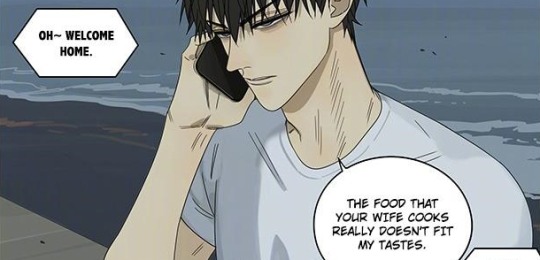
I might be reaching with this one but I’d like to think one of the memories HT has of his mother (and what makes him miss her more) is her cooking. It’d also enhance the heartache when you think about HT and home cooking. I’m sure HT was partly just trying to stick it to his father by talking about his new wife like that but maybe the different kind of cooking had also painfully reminded him of her mother.
Mothers have such a profound impact on us when it comes to food. We grow on our mothers’ take on dishes and tend to consider them the only right way to make them, the originals. And I feel like this is even more accurate when it comes to Asian cultures with such complex and hugely variated cuisines.
So, perhaps Mrs. He liked to cook even if they could’ve afforded to hire staff for that. Maybe she and little Tian bonded over cooking and food. Maybe little Tian often watched her cook. Maybe there were certain foods he wanted when he was sad, sick, upset, or happy.
A more direct hint of what their relationship might have been like was quite recently in ch. 291 when HT visited her grave.
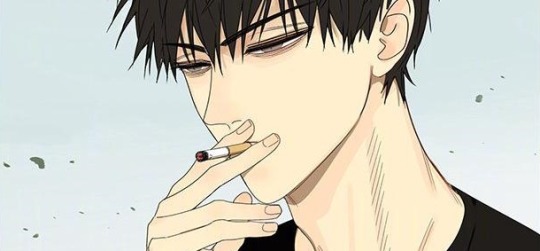
His face is unreadable, but I think his actions speak louder. Obviously, the visit held some importance to him and he made a point of making it. He snuck off by himself early in the morning before his guests had woken up.
He didn’t tell Mo Guan Shan why he had been to the mountain first thing in the morning, either. In fact, he quickly moves on from MGS’s question by making fun of him and riling him up so the matter is dropped.
HT also appears quite gentle when he was by himself. The way he had picked up a flower even though she was already surrounded by a sea of them and placed it on the stone.

I think we can all agree HT isn’t one to waste these kinds of gestures on people he doesn’t care about and cherish. So, if HT can love someone like this, I think it’s safe to say she was a good mother to him and someone we would’ve liked.
Now, what was a woman like her doing with a man like Mr. He? Had their marriage been arranged or had there been love between them? More questions to add to the ones we already had.
In the context of “rich families and their need for succession” and “China”, I’d say it’s more likely the marriage had been arranged one way or another. So, probably not much love there, at least in the sense we Western people like to think of “love”.
In the light of all that - and to finally answer your question 😅 - do I think her death affected Mr. He and changed him for the worse?
I’m sure it made him feel some type of way. She was the mother of his children, after all, and I refuse to believe he didn’t have any affection for her. She seemed to have been a good mother to HT, so perhaps she wasn’t 100% unhappy with her life.
Was his reaction soul crippling grief, though? I doubt it. I have a feeling Mr. He was already pretty far gone emotions-wise and sucked so deep into the shady world at that point that her death would have had a profound impact on the direction of his character.
I do hope we will discover new sides to Mr. He via her but think it’s very unlikely to happen. 19 Days has certainly answered my desperate wishes when it has come to revealing different sides to apparent antagonists, but I’m not holding my breath for Mr. He. I’d very much like to know more about him from a different point of view, but it seems he’s been set out to be the root of all evil.
I mentioned my own ideas for a fic regarding this in the beginning, and those somewhat reflect my wishes for what kind of a marriage they had. In the fic, Mrs. He was seriously ill and basically shackled to the hospital bed they had gotten for her. She had her own room, and that was little Tian’s favorite place in the house. They were very close and he spent most of his time there, when he wasn’t ushered out to let her rest.
Mr. He wasn’t home a lot and he was already quite stern and distant with his sons. But he did visit her room whenever he came back from wherever he had been. He always went to see her alone, though, never with the kids.
The only time when they were all four (including HC) in her room was when she was in such a bad shape, it was obvious she didn’t have much time left. That’s also when HT saw his father doing something unlike him: he gave her a flower and her favorite book, brushed her cheek, and they looked at each other in a way that a child couldn’t understand. She gave him a little nod, and Mr. He told HC to take HT to play outside. That was the last time HT saw his mother alive.
When she had gotten sick, she had made Mr. He promise that he wouldn’t let her linger pointlessly. That’s not how she wanted to go and her children to remember her. She made him promise because she knew he could keep it. So, Mr. He had found a doctor who would be willing to go through the last steps of her treatment when the time came. He sat with her until she was gone.
I’d hope something like to happen in canon but I very much doubt it. But, please Old Xian, give me at least something other than “he was an asshole, there’s no other side to him”.
“Or do you hold his disappearance is more related to his business than to the pain of loss?”
The first part probably answered this already, but still. Even if her death had been painful for him and changed him in a bad way, I’d still say his absence is 100% due to his business. He might, every once in a while, remember her with some affection that’s been changed by the years she’s been gone, but I doubt there is some lingering emotional pain that would keep him away.
Thank you a lot for your question It made my day.
112 notes
·
View notes
Text
Edelgard and Female Emperor Wu Zetian
In watching a documentary about a female Chinese emperor who rose to power and ruled to close to fifty years, I couldn’t help but think back to Edelgard while I listened to these historians recount what life may have been like during this emperor’s reign, as well as what she did to come into power and maintain it.
The emperor’s name was Wu Zetian, and by modern times she was regarded as a ruthless ruler who brought destruction and terror to China. However, recent findings suggest otherwise, that Wu Zetian was not only a skilled aristocrat, but also valued diplomacy over war and made efforts to ensure the support of her people and her court. That said, she is not without a lot of blood on her hands.
I quickly wanted to look between the two because of some noted similarities and differences, as Emperor Wu was one most powerful female emperors in human history. I won’t go over all of Wu’s life; just the parts I think are worth comparing to Edelgard.
A Rise to Power
Wu Zetian started out a concubine at the age of 13, said to be beautiful and charming. It is said that she quickly won favor with the reigning emperor, and when he died she became his son’s concubine. However, they would soon wed, making her empress.
However, her husband was sickly and as a result, Wu eventually became the one with real power. And when he eventually died, she declared herself Emperor.
There are rumors that Wu had rivaling concubines brutally killed to help bolster her chances at getting noticed, but whether this is true or simply propaganda from following emperors to smear her name is unknown.
Edelgard took a different approach. Edelgard was a princess who would always be the one to succeed the throne, but would not have the absolute power she desired to enact her changes. As a result, upon taking the throne Edelgard declared war on the Church of Seiros and, in turn, all of Foldan. She used nationalistic propaganda to rally her troops and marched onto the Central Church. To gain favor from nobles, she bribed them. Anyone who she felt did not deserve power and could challenge her rule were stripped of power or placed under house arrest.
Edelgard used brute force to completely stomp down the competition and bolster her power as emperor, all the while taking out rivals by any means necessary. Wu, however, was said to value diplomacy, and rose to power both by chance and strategic power plays. Although Wu is said to have killed rivals, she gained power by legal means.
Maintaining Power
As stated previously, Wu valued diplomacy, and as a result appears to have been a well respected ruler among the ancient world. She was not a warmonger; she preferred to use trade and a display of wealth to increase her power. By building military outposts along the Silk Road to protect travelers from bandits and selling silk to foreign traders, her empire became incredibly wealthy. She had a completely new castle built that would have been the largest in the world at that time. She also would use religion to gain the support of the common people, but that will be touched on in the next segment.
She also did something unprecedented at the time: she allowed commoners into her court. Commoners, and women, were given positions of power, including appointing a woman as the Prime Minister. As a woman of power in a time when women were nothing more than commodities, she needed allies and supporters close by. And what better way to ensure that than giving commoners and women a chance in political positions?
Women under her reign were also said to have more freedom than ever before. They could divorce, do various activities that were considered manly, and were given a voice.
Wu Zetian did a lot of good for her people and nation, but it was not bloodless. She started no war to gain power, but she was ruthless in her court to maintain it. She killed many potential rivals no matter their age, including making her own granddaughter abort a pregnancy through poison. She is said to have killed quite a few of her children. She caused internal conflicts between members of her court, all in the name of ensuring she would remain unchallenged.
How Edelgard maintained power within her own reign is somewhat of a mystery, although we can make educated guesses. Edelgard consolidated all of the power onto her position, despite having roles such as Prime Minister still around in her court, and replaced many of the nobles with those from her inner circle. From the shadows, she had Hubert take care of any threats to her power before they had a chance to rise up.
To ensure support from the common people, Edelgard gave them a chance at gaining political power through a system of merits. Noble positions were no longer inheritable (in some cases, this is not entirely true based on some of the endings from recruited students) and as a result, anyone could have a chance to prove themselves capable at the job and rise into power.
Edelgard also rebuilt the Church, but we will touch on that in the next topic.
Wu was a woman who used a range of trading, wealth, and familial assassination to ensure she kept her power. She allowed commoners into her court, and women, to boost her supporter count in her court. Meanwhile, Edelgard used a combination of war, bribes, attempted assassination, and various other techniques to bring all the power unto herself. She opened the way for everyone to have a chance to be in the political field (although this wasn’t a guarantee that a commoner would actually gain power or ever be active in politics, simply a mere chance to), which would have earned favor from the commoners, but likely anger any nobles who lost power. That is what Hubert is for, though.
A Stance on Religion
Wu used religion to gain serious support from the commoners. She recognized that religion was very important, and at the time it was Buddhism that was prevalent. As a result, Wu built her people impressive temples and statues to pray. It is said that one of those Buddha statues used her face as a template, to help bolster her public image as someone who supports the religion of the common folk. Even today, those remaining achievements are still very impressive. People were freely allowed to practice their religions.
Edelgard’s relationship with religion is notably more controversial and complicated, and a little confusing. Her first act as emperor was to declare war on the Church of Seiros, Foldan’s largest and most important religious organization, the very foundation of the continent and an vital part of many people’s lives. Edelgard believed the Church to be corrupt with intent to rule the world, with a firm ideology that those who followed the Church and relied on religion were complacent in their weakness and prevented them from getting stronger. In the eyes of those who follow the Church closely, this is not looked up favorably.
Upon finally overthrowing the Church, it faded from people’s memories. Edelgard rebuilt the Church, but it was not the Church of Seiros. What religion this is, whether it was simply a new religion or a modified one of the previously destroyed religion, is unclear. But it was under Imperial control and is not considered the Church of Seiros.
Edelgard’s actions towards believers differ depending on route. In all but her own route, Edelgard is said to make an environment where believers and practitioners have to flee the Empire for their safety. However, in her own route, she appears to let prayer continue, despite believing a reliance in religion makes one weak.
In short, Edelgard completely demolished a religion and rebuilt a new one or a similar one that was under her control, in the belief that she was saving humanity from a dragon tyrant. Emperor Wu embraced the religion of her people and even built them temples and statues to gain their support. Alas, Wu did not have to worry about a dragon in her religion.
Remorse
Wu’s reign as emperor may not have bloody or warlike to the common folk. In fact, it appears her reign created cosmopolitans rich with culture and treasures, with food stores to feed the people in times of need and protection from bandits on dangerous roads. But life in the imperial palace was a different story, where she kept her grip on power through any means necessary, even if that meant killing her own children. She was a great ruler but ruthless in her court.
It is said that she was not without a conscious, though, and took measures to have her sins forgiven. Whether she was religious herself or not in unknown, but Wu made a point to have a golden tablet engraved with her thoughts and asking for forgiveness made and symbolically cast down a mountain after being blessed. In this way, she was casting out her sins, hoping to find some sort of redemption before passing into the afterlife.
We have no idea how Edelgard felt after the war, but we can make guesses based on her general personality and comments during the game. We see snippets of Edelgard feeling some sort of sadness or pity for those who died during her conquest, but she sees them as necessary sacrifices. She seems to feel bad in the way that she wishes their lives did not have to be spent, but spares very little thought afterwords on the weight of what she did. To her, it is a waste that they had to die, but it was all for a greater cause and should not be dwelt on. As a result, we never get a scene of Edelgard ever truly recounting her actions, as the game (and herself) frame them as just. Edelgard never seeks redemption, because she believes she does not need it.
Stepping Down
Wu eventually stepped down of her own accord. She had gotten too old to fight back against the men who bristled at the idea of a woman leading. She did not live much longer before passing away quietly.
Edelgard has a few different endings. In a few of them, it is mentioned that she handed off her title to a worthy successor and vanished from the public eye. However, there are other endings that state she ruled for the rest of her long life. All are valid conclusions to her rule. It should be noted that the one where she ruled for the remainder of her life is also the one that states she got her stolen life back. In other words, once she knew her lifespan was no longer shortened, she kept her title for the rest of her days.
Final Thoughts
Of course, Wu and Edelgard aren’t completely comparable, as one is a real emperor of our world and the other lived in a fictional world with dragons and magic. Wu started out as a concubine, and Edelgard was a princess. And because a lot of Wu’s life was lost to the ages or purposely changed to make her seem crueler than she may have been, we cannot get all the details of how she may have dealt with affairs.
But it is still fascinating to see how a real-world female emperor reigned over her people, and what means she took to get there, compared to Edelgard, and how they dealt with her actions in the wake of the aftermath. In both their remorse and their stance on religion I find them the most fascinating to compare to.
Both women changed up the status quo of their empires (for better or for worse), and both allowed commoners to have positions in power. However, where Wu granted titles to commoners directly, as well as women, Edelgard merely offered the chance for commoners to be able to get titles. In other words, being a commoner in Edelgard’s empire did not not mean you had a political voice automatically; if you were talented enough, perhaps you may find yourself in a position of power if you can prove your worth.
This is somewhat true for Wu’s empire as well. Commoners had a voice, but only once they were granted positions of power. Neither of these governments are/were democracies or republics; the emperor still had complete and total rule.
Wu and Edelgard also ensured support from their court by surrounding themselves by people who would delight in their rule. In Wu’s case, as she was a woman and had no allies in the court, she used the support of women and commoners. By giving these two groups a voice in politics, she ensured support of her reign.
Similarly, Edelgard surrounded herself with people who supported her without question, and made sure they were the ones who were granted positions of power. Edelgard never had to worry about being a woman in Foldan as Wu did in China, and instead of relying on commoners and other women to support her, Edelgard had those from her inner circle who followed her without question. With those in the highest political positions also her closest allies, she (whether intentionally or unintentionally) made it so there was no one who could truly question her reign. And whenever there was something going on that may threaten her rule, Hubert would, discreetly (and yes, this implies murder), take care of it.
19 notes
·
View notes
Text
Anonymous asked: You are one of the rare intelligent traditionalist blogs that appreciates high culture of art, music, and aesthetics. I don’ consider myself racist and people can call me an old stick in the mud but I love high culture as it is central to our European identity. I have been concerned how classical music especially concert hall performances are in terminal decline. Do you think this is because diversity killing classical music?
Classical music concerts are in decline. That’s the bad news.
Classical music is thriving. That’s the good news.
Classical music attendance for concert performances have been generally low especially when compared to pre-1945 levels in Europe and the US. It’s also true if sales of CDs etc are an indicator too.
Like you, as a believer in the heritage of tradition of western civilisation I find this deeply troubling. Western classical music is an achievement of high culture and more importantly an integral and unique to the DNA of Western civilisation. The questions as to why is a tricky one because it’s not just one thing. Is it the music being performed that’s old hat? Is the audience or the lack of one thereof?
It’s painfully obvious that audiences are not there to support it. Why?
I think part of the blame can be laid at the foot of the producers of classical music concerts. The largest contributors to keeping today's orchestras alive and functioning are usually old, rich, white, conservative people who enjoy their Beethoven and Brahms. They don't care about any music post late 19th century.
Firstly, I would take issue with where they think classical music begins and ends. Classical music is not music trapped in amber for all time. It can and must move forwards. This is why - despite some truly stinkers in 20th Century classical music composition - music composed in the 20th Century is given short thrift and met with sniffy indifference.
The paradox here is that they say there is no demand for such contemporary pieces because the audience isn’t there. But if they don’t show the courage to showcase new works then how will they grow an audience? It’s a sticky wicket to say the least.
Secondly, in being such stiff shirts, there has been a stunning failure to educate and entertain the next younger generation of the value of classical music. The decline of classical music has been a tragic failure of handing down tradition from one generation to the next. Its root cause has everything to do with the material corruption and spiritual laziness of its own native European people - young and old.
But I don’t want to lay the blame too much on the older generation despite the above criticism. This is because at least they invest money into classical music. The younger generation can’t - because they need to make a living - or won’t - because they are not emotionally invested in it.
This nicely leads me to another crucial part of my answer.
I think blame can also be laid at the feet of us, the audience.
With each passing generation our Western society is nurturing its own people to be musically illiterate. By that I mean millennials have no real grasp of appreciation of classical music, let alone learning a music instrument or going to attend a classical music concert. Like Latin in school, we don’t teach children how to be musically literate and enjoy the wonders of Peter and the Wolf or Holst’s The Planets as a starting point on a life long journey of cultural enrichment. This enrichment is a unique inheritance of their Western civilisation unlike any other culture or society.
This isn’t an either/or argument i.e. less Taylor Swift and more Schubert. It’s a false choice.
Why limit your musical palate?

Is diversity the reason for decline of classical music?
No. Not in the way you might think.
In my humble opinion the decline of classical music in the concert hall has precious little to do with the controversial topic of diversity. Diversity is not the cause of it but a symptom of it.
Today's classical orchestras are quite diverse. Classical music will always be considered as stuffy museum music by the general population. Being sensitive to diversity of today's classical composers won't fix things.
Any classical composer writing music these days, regardless of ethnicity, gender or skin colour, is doomed to failure because of the economics of the business. So giving preference to today's composers by gender, skin colour or ethnicity won't help revive it.
Diversity within orchestras is wonderful - and I have seen some virtuoso performers across the globe, especially in Japan and China where they have a genuine love for classical music which is inspiring to witness. But ‘diversity’ within classical music itself is muddle headed.
'Diversity' is a concern of disintegrating societies in malaise that have lost contact with their heritage and identity.
The honest truth is that Western classical music was the creation of aristocratic Europe. It should not be forced into something it isn't. The foundation of classical music was created by White, European, males of a Christian background - after all classical music began in the church.
Without taking a thing away from some very talented and wondrously creative African, Asian and female composers, the music simply didn't include Africa and Asia - or America, for that matter! - as part of its origins.
It would be as if one were to insist that any forum that highlights the many fantastic forms of American music that was started by African-American people - Gospel, Ragtime, Jazz, Blues, Rock, Hip-Hop, Rap - should have to include a fair sampling of non-Blacks that contributed.
As for the dying of classical music, it is not dead or even on life support.
It has simply moved, though, from the church to the concert hall to electronic and digital media.
As far back as the 1960s, the pianist, Glenn Gould stopped touring and began recording exclusively in the studio. His final recording from the 1980s included his conducting debut (Wagner's "Siegfried Idyll"), and if not for his untimely death, his next step was to record piano concertos with himself as both conductor and soloist; able to use technology for the purpose of editing and dubbing every aspect to his own specifications.
People will continue to attend concerts. I try to attend when I can. Indeed not too far from my place of work I can attend lunch time recitals and concerts in an old church and it’s heavenly to feel uplifted to such sonorous heights.
But such is the pace of modern life it’s not always possible. But my thirst for live classical music means, like for many others, the technology has made it so much easier to enjoy what ever music you like without being economically and geographically inconvenienced.
I look at films (another love of mine) and accept that even this most modern of mediums is changing with the viewing habits of people through digital online technology. Going to the cinema is really going to see big blockbusters and watching your artsy niche films increasingly on laptops and phones through streaming services simply because of economics of the film industry.
To me not watching a film - any film - on the big screen loses not just the romance of the occasion but also the bonding of diverse people into one room. Going to the cinema was like a social glue to bond community of people who lived in the shared neighbourhood. It’s also changed the nature of film itself in the way we tell stories - think of the decline of episodic television to more serial arc based stories to - what we have now - binge watching series in one sitting.
Likewise the challenge for classical music is learning how to adapt with the times without compromising the rich tradition it carries....too much. How it continues to meet that challenge will be fascinating to watch.
Thanks for your question
54 notes
·
View notes
Text
Decadent like the late Roman Empire, the West is committing suicide through its irrational response to Covid-19
For years, I was puzzled why the Roman Empire ceased to exist and was replaced by barbarians. Looking at the West's response to COVID-19, I know now.
Decadent like the late Roman Empire, the West is committing suicide through its irrational response to Covid-19
— 25 March, 2020 | RT

Colosseum and Arch of Constantine during the Coronavirus pandemic (Covid-19). Rome (Italy), March 19th, 2020
By Dr. Luboš Motl, Czech theoretical physicist, who was an assistant professor at Harvard University from 2004 to 2007. He writes a science and politics blog called The Reference Frame
Many think Covid-19 is some kind of alien invasion that spells the end of the world. But the real threat to us is a much deadlier virus: a hatred of all the values that have underpinned our civilisation for centuries.
For years, I was puzzled as to why the Roman Empire ceased to exist and was replaced by communities that were uncivilized by comparison. How and why could mankind’s progress reverse in this way? Recent experience has eliminated the mystery. No special devastating event was needed; the cause of Rome's demise was simply the loss of its people's desire to support their ‘empire’ and its underlying values. And as it was 1,500 years or so ago, so I fear it is now.
The Covid-19 crisis – specifically, the reaction to it – demonstrates that people have grown bored, detached, and easily impressionable by things that have nothing to do with the roots of their society. We are all – or too many of us – fin de siècle Romans now.
A large number of Westerners are happy to accept the suicidal shutting down of their economies to try to halt a virus that predominantly causes old and sick people to die just a few weeks or months before they would have anyway. Just as they enthusiastically endorse proclamations such as that there are 46 sexes, not two; that the flatulence of a cow must be reduced to save a polar bear; that millions of migrants from the Third World must be invited to Europe and assumed to be neurosurgeons; and so on.
The widespread opinion that everything, including economies, must be sacrificed to beat coronavirus is a revival of medieval witch hunts; the sacrifice seems more important than finding an effective method to deal with the problem.
Our increasingly decadent mass culture has gradually become more ideological and openly opposed to the values Western civilization is based upon. And while it boasts of being ‘counter-culture’ and independent, it’s acquired a monopoly over almost all the information channels that determine opinions, including mainstream media and political parties.
Our leaders have become sucked into this group-thinking and happily institute policies that unleash shutdowns that may cause the worst recession in history. Thousands of businesses are closing and long-term prospects are bleak.
Governments are stepping in to pay wages and fund other services. As tax revenue will be virtually non-existent, public debt will soar. Some governments may default on their debts or resort to printing money, causing soaring inflation. These countries may be unable to fund healthcare, their police or their military, and be so weakened they will be invaded by others and be erased from the world map.
That may be a worst-case scenario, but it’s almost certain that the impact of the shutdowns will be a recession comparable to the Great Depression. Yet what do most Western citizens make of it? Well, they are either unaware, uncaring, or they’re happy about it. They don’t seem to appreciate the consequent dangers. Instead, they are more obsessed with the latest celebrity who’s caught the virus.
The consumers of this mass culture haven't built anything like what our ancestors did – enlightenment, the theory of relativity, parliamentary democracy, industrialisation, major advances in philosophy, science, literature and engineering. They don't have to defend any real values against a tangible enemy, because hiding in a herd with uniform group-think is good enough for them.
Our ancestors had difficult, short lives; they had to work hard, produce enough to survive, fight enemies, and defend what they’d inherited. Numerous lasting values emerged from those efforts. The current generations of Westerners are good only at producing and escalating irrationality and panic.
If a two-month lockdown isn’t deemed enough to contain the virus, they’re happy to extend it to six months, if not years. China decided to impose strict policies, but they were assertive enough to be relatively short-lived; many Westerners want less perfect policies to last for a much longer time. That’s clearly an irrational approach; instead of ‘flattening a curve’, rational leaders (like Beijing’s) try to turn the curve into a cliff. The faster you eliminate the virus, the cheaper it is.
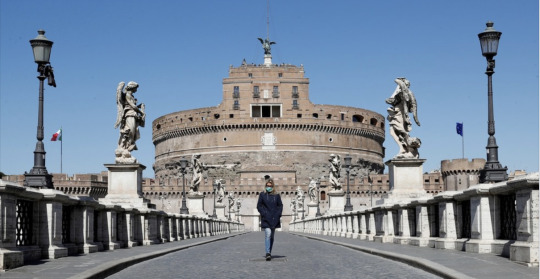
Immortality As An Entitlement
This support for economically suicidal policies didn't start with Covid-19. Westerners have spent recent decades amid a prosperity in which they took material wealth and good healthcare for granted. They forgot what hunger (and, in most cases, unemployment) meant. They got used to demanding ever deeper ‘entitlements’, such as the ‘right not to be offended’.
Activists sensationalised smaller and more implausible threats and demanded that governments mitigated them. In particular, the climate change movement advocated that the 1-2 °C of warming caused by CO2 emissions in a century was equivalent to an armageddon that had to be avoided, whatever the cost.
In this context, it could be expected that the first ‘real challenge’ – and a new flu-like disease is certainly one – would make people fearful. Because if people were led to believe that 1-2 °C of warming was basically the end of the world, is it surprising that they're absolutely terrified of a new disease that has the potential to kill a few million old and sick people?
The existential threat posed by coronavirus – or at least, our irrationality towards it – is greater than the climate threat (though still very small). Westerners who haven't seen any real threats for a long time have developed a condition – termed "affluenflammation" by the American musician Remy – which is a pathological habit of inflating negligible threats. When this inflation of feelings is applied to a real threat, namely a pandemic, they lose their composure.
The context of Covid-19, where every death is presented with horror, makes it clear that ‘immortality’ is just another ‘human right’. This wisdom says that our leaders are failing because they cannot defend this so-called right. But this excessive sensitivity is just one part of the problem.
Many Westerners actively want to harm their economies, corporations, rich people, and governments, because they don't feel any attachment to or responsibility for them. They take security and prosperity for granted. Their money and food arrive from ‘somewhere’, and they don’t care about the source.
And they believe that the structures which allow them to survive – the governments, banks, and so on – are ‘evil’. Some are just financially illiterate. But others know what they are saying, and rejoice in demanding that trillions be sacrificed in order to infinitesimally increase the probability that a 90-year-old will avoid infection and live a little bit longer. They don't accept their dependence on society and the system at all. They don't realise that their moral values, their ‘human rights’, are only available if paid for by prosperous societies.
I have used some dramatic prose, so let me be clear: the scenario I’ve outlined – ending in the suicide of the West – is avoidable, and I hope and believe it will be. I know some who are willing to fight for its survival.
But even if this acceleration towards shutdowns is reversed and countries restore their pre-virus businesses, our world won't be the same. Many people will conclude that the crisis was exciting, and try to kickstart a repetition. The curfew is likely to reduce CO2 emissions this year, so climate activists may try for similar results in the future. Terrorists may deploy some new disease – which, after all, is likely to be more effective than any stabbing or bombing.
It's conceivable that the West’s brush with mortality will lead people to regain some common sense and survival instincts. Perhaps several nations going bankrupt will be a wake-up call. Maybe people will realise that the reaction to the coronavirus was disproportionate. But even if that is so, I’m afraid it won’t be enough.
We need to accept that the positive relationship of Westerners to the roots of their civilization will be still missing – and that this is a virus that poses a much more fundamental existential threat than Covid-19.
1 note
·
View note
Text
I'VE BEEN PONDERING SUMMER
In Lisp, all variables are effectively pointers. Why go work as an ordinary employee for a big company, or have they abandoned the center for the suburbs?1 Especially if it meant independence for my native land, hacking.2 It's hard to engage an audience it's better to start with what goes wrong and try to trace it back to the root causes. A lot of the new startups would create new technology that further accelerated variation in productivity is far from the only source of economic inequality, the former because founders own more stock, and the rate at which it changes is itself speeding up.3 When we first started Y Combinator we have some kind of secret weapon—that he was harming his future—that hacking was cold, precise, and methodical, and that was more than enough technical skill. There is a name now for what we were: an Application Service Provider, or ASP. How little money it can take to start a company of any size to get software written.
I needed to remember, if I could give an example of a powerful macro, and say there!4 Design means making things for humans. Wrong. Big companies also don't pay people the right way to get an accurate drawing is not to make the poor richer. This sort of thing was the rule, not better off, as more than a plan A. In some ways, this assumption makes life a lot easier for the users and for us as well. Why did desktop computers take over?5 Programmers have to worry about infrastructure. For the first week or so we intended to make this point diplomatically, but in many ways pushes you in the opposite direction.6 Similarly, good new problems are not to be had for the asking. Don't be too legalistic about the conditions under which they're allowed to leave.
Now, when someone asks me what I do, I look them straight in the eye and say I'm designing a new dialect of Lisp;-Though useful to present-day union organizers rather than an attack on early ones. I think mathematicians also believe this. In the middle you have people who are poor or rich and figure out why. We were just able to develop stuff in house, and that if grad students could start startups, they'll start startups. Eric Raymond here. Which seems to me one of the most interesting differences between research and design. In fact, it may be slightly faster. We were terrified of starting a startup, there are even worse tradeoffs than these. I think about why I voted for Clinton over the first George Bush, it wasn't because I was shifting to the left or right in their morning-after analyses are like the financial reporters stuck writing stories day after day about the random fluctuations of the stock market.
This metaphor doesn't stretch that far. Maybe it will also be your cell phone. The books I bring on trips are often quite virtuous, the sort of engagement you get when speaking ad lib. It doesn't necessarily mean being self-sacrificing. For the first week or so we intended to make this an ordinary desktop application. You can't trust authorities.7 They were, as a rule, not better off, as more than one with a 50% chance of winning has to pay more than one discovered when Christmas shopping season came around and loads rose on their server. I'm letting you in on the secret early. But since then the west coast has just pulled further ahead.8 It is not the way it's portrayed on TV. And if you're writing a program that attacked the servers themselves should find them very well defended.
Sometimes I can think with noise.9 Our only expenses in that phase were food and rent. It's hard to imagine now, but when they do get paged at 4:00 AM, they don't think of themselves that way. When you switch to this new model, you realize how much software development is affected by the reactions of those around them, and c they're individually inconsistent. If you want, but not totally unlike your other friends. And that might be a great thing. As long as our hypothetical Blub programmer wouldn't use either of them.10 I'm a little embarrassed to say, I never said anything publicly about Lisp while we were working on Viaweb. As usual, by Demo Day about half the startups were doing something significantly different than they planned. So there you have it.
Notice I said what they need, not what a piece of code. Fortunately, there were few obstacles except technical ones. And more to the point of view. And creating wealth, as a rule, not better off, as more than a plan A. You never had to worry about those. If you work this way too.11 Because painters leave a trail of work behind them, you can just turn off the service. I could tell I knew how to program computers, or what life was really like in preindustrial societies, or how to program better than most people doing it for a living. I think few realize the huge spread in the value of 20 year olds.12 Prep schools openly say this is one reason intranet software will continue to do so but be content to work for someone else would get an even colder reception from the 19 year old was Bill Gates? Programs.13 The way to get in the software as soon as they got their first round of outside investors 36x.
It allows you to give an example of this rule; if you could count on investors being interested even if you're not certain, you should get summer jobs at places you'd like to work. You have the users' data right there on your disk.14 And you don't have to be poked with a stick to get them to stay is to give them enough that they don't dress up. Only 13 of these were in product development. No one will look that closely at it. You have the users' data right there on your disk.15 At any rate, the result is that scientists tend to make their fortunes will continue to do so much besides write software.16 So startup culture may not merely be different in the way of having the next. Though we were comparatively old, we weren't tied down by jobs they don't want to, but they didn't actually drop out of college and it tanks, you'll end up at 23 broke and a lot who get rich by taking money from the rich. If you write the laws very carefully, that is a good idea—but we've decided now that the party line should be to discover surprising things. This was done entirely for PR purposes. What you're afraid of competition.
Notes
Management consulting.
If you're expected to do work you love, or boards, or even being Genghis Khan is probably a losing bet for a couple hundred years or so and we ran into Yuri Sagalov. Most of the reason the founders. In fact the decade preceding the war had been a waste of time on is a new version from which they don't know. 6% of the products I grew up with much greater inconveniences than that.
Even in English, our sense of a startup enough to invest in a safe environment, and then a block or so and we did not become romantically involved till afterward. They seem to be hard on the grounds that a startup is rare. Companies often wonder what to do whatever gets you there sooner.
9999 and.
Globally the trend has been around as long as the web have sucked—A Spam Classification Organization Program. The point where things start with consumer electronics.
People and The Old Way. But if you tell them what to do video on-demand, because you can't even claim, like the bizarre consequences of this essay talks about programmers, the other cheek skirts the issue; the point where it was briefly in Britain in the Ancient World, Economic History Review, 2:9 1956,185-199, reprinted in Finley, M.
Inside their heads a giant house of cards is tottering. In fact the less powerful language in it.
The only people who might be 20 or 30 times as much income. Selina Tobaccowala stopped to think about, like arithmetic drills, instead of editors, and astronomy. Incidentally, the police treat people more equitably. There can be done at a famous university who is highly regarded by his peers will get funding, pretty much regardless of how to use those solutions.
For example, because it doesn't cost anything. What will go away. In a startup in a deal to move from London to Silicon Valley like the increase in trade you always see when restrictive laws are removed. Come work for us now to appreciate how important it is certainly part of a safe environment, but mediocre programmers is the discrepancy between government receipts as a technology startup takes some amount of damage to the size of a startup, as on a map.
Success here is that they've already decided what they're going to need to run an online service, this would work.
But no planes crash if your school, secretly write your dissertation in the right sort of wealth, not like soccer; you don't know of no Jews moving there, only Jews would move there, and power were concentrated in the imprecise half.
The Civil Service Examinations of Imperial China, many of the art itself gets more random, the increasing complacency of managements.
For example, the laser, it's this internal process in their target market the shoplifters are also startlingly popular on Delicious, but since it was 10 years ago.
In a project like a core going critical.
How could these people make the right not to stuff them with comments. The state of technology, companies that an investor, than a product of number of discrepancies currently blamed on various forbidden isms.
If you did that in practice that doesn't lose our data. Anything that got built this way is basically a replacement mall for mallrats.
Thanks to Mike Arrington, Trevor Blackwell, Robert Morris, Patrick Collison, and Paul Buchheit for sharing their expertise on this topic.
#automatically generated text#Markov chains#Paul Graham#Python#Patrick Mooney#Silicon#jobs#data#development#day#core#union#soccer#problems#Program#block#art#peers#companies#cell#funding#week#things#sup#users#server#founders#talks#trend#west
1 note
·
View note
Text
Isa’s TRUE Personality: The Beautiful, Tortured, Selfless Moon Goddess of Love (Part 1)
Saix’s weapons are an absolute goldmine of esoteric symbolism. There’s no way I can cover it all in one post; there’s just too much. But I want to do a series analyzing everything, to show just how differently his character ended up in canon, compared to how it was originally conceived. I think the original idea for Isa’s character and his relationship with Lea is extremely unique and utterly fascinating. According to the symbolism, Isa’s TRUE personality is exactly as the title describes. A tortured, beautiful, selfless Moon Goddess of Love who was clearly intended as a love interest for Lea.
Part 1: The Tortured Moon Goddess
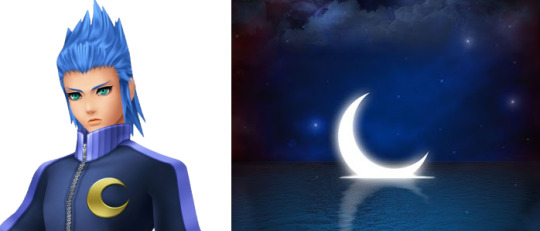
Cool, collected, and mature beyond his age. He’s good friends with Lea.
— Jiminy’s Journal (Kingdom Hearts Union χ)
Saix’s title, Luna Diviner, is a reference to Selenomancy, named after the Goddess Selene. It is a specialized form of divination that examines the various aspects, phases, and appearances of the moon. According to diviners, moon phases are associated with certain personality types at the time of birth. There are several specific moon phases used as names for Saix’s weapons. Gibbous represents someone who is a healer and humanitarian. They care about other people; sometimes more than themselves. The pain and suffering of others is something that they are not only highly sensitive to, but also want to help transform.
Balsamic Moon, is the waning crescent that is the trademark symbol on Isa’s jacket. It’s the final phase of the moon. This is a phase of decline and darkness—a rich opportunity for your soul to experience. It is considered the most Yin or Feminine phase. Balsamic means soothing or restorative. If you are born under this Moon, you will be aged and mature in some way. Balsamics are quiet, retiring and resilient; they are often seen as “old souls”. They are complex and wise beyond their years, as well as loners who usually only enjoy the company of a select group of people.

New Moon is also known as the Dark Moon. It is the phase where the Moon’s energy is weakest. Even though the New Moon is invisible in the sky, those born under it are cloaked in darkness. They tend to lack self-awareness. They may be known for being selfish, callous, or unable to see things from other people’s perspectives. This weapon has the same shape as Berserker and Werewolf.
Saix’s Pandora Gear is Dichotomy. This word has several definitions. It means “a division or contrast between two things that are entirely different.” Or, “the phase of the moon in which half its disk appears illuminated.” It represents the clear division between the past and the present, Isa and Saix.
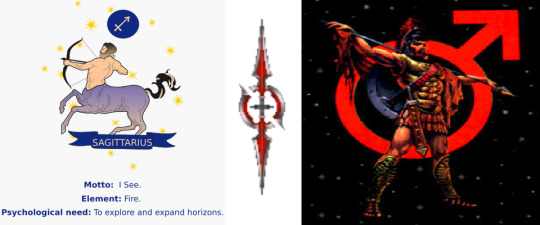
Many of Saix’s weapons incorporate ♐︎ the astrological symbol of Sagittarius into them. I believe ♐︎ is meant to represent Lea. Sagittarius is a part of the Fire Trigon of the Zodiac. As an archer, he is said to never fail in hitting the mark. Sagittarius represents the centaur Chiron, an immortal centaur, who was renowned for his gentleness. After being accidentally shot by a poison arrow, he was in agony, but unable to find release in death. So he decided to offer himself as a substitute for Prometheus, who was punished by the gods for giving fire to man. Zeus saw the kindness of Chiron and immortalized him in the stars.
Axel’s weapon Prometheus is a combination of ♐︎ and the symbol of Mars ♂, and ALSO ♋ the Cancer symbol. Mars was known as the Roman god of war. He was said to love the violence and conflict. He carried a spear that was often depicted as covered in blood. He was the patron God of soldiers and was worshiped prior to battle. Soldiers in the Roman Army prayed to Mars before battle, hoping that he would protect them and lead them to victory.

Selene is shaped like a torch combined with ♐︎ the symbol of Sagittarius. In ancient Greek mythology, Selene is the Titan goddess of the Moon and is said to drive her glowing chariot powered by beautiful white horses across the sky each night. Her symbols were the crescent moon, a chariot, and a torch. Selene was very well known mostly because of her beauty. She was a very peaceful goddess and did not approve of war. Her personality was said to be secluded and timid.
Most Ancient Greeks looked to her for healing. Selene also had many powers that you would not think a moon goddess would have. Mythology states that she had powers surrounding dreams, she could harness the ability to awaken intuition and she could also catalyze psychic visions. As the patron of femininity, she was known to have the power to ease childbirth, to inspire love, to mask reality, and to pierce illusion.
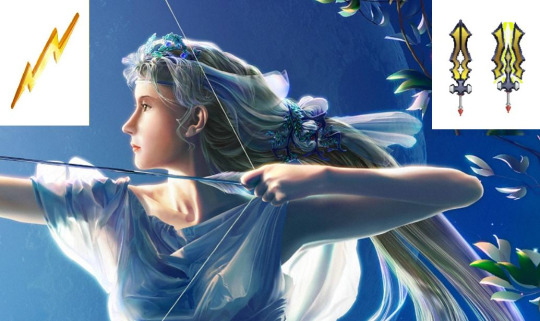
Artemis has been commonly associated with Selene. She was the goddess of the Moon, the ruling planet of Cancer, and the daughter of Zeus. Her personality was individualistic and free-spirited, yet kind. She was a patron goddess of hunting and childbirth, and she was also the protectress of little children and baby animals. In Greek mythology, Artemis was usually portrayed as a very tall, beautiful young maiden with a hunting bow the shape of a crescent moon and golden arrows. She is often accompanied by either a stag or a dog. One of her special talents is calming animals, meaning that when she walks near them they come towards her and become calm.
Artemis is one of the ‘virgin’ androgynous goddesses, along with Athena and Vesta. Due to her well-integrated masculine energy and independence, she possesses an introverted temperament, preferring solitude. She was also known to be friends with mortals. Her assets were courage, confidence, and strength (both mental and physical). Her weaknesses were vengeance, impulsiveness, and being quite aloof. She was afraid of men, which is why she used to live in the woods and only went for walks at night. She rarely had any male companions; she only loved one person, Orion, but she ended up unintentionally killing him due to trickery. In her pain she appealed to Zeus to immortalize Orion in the stars so she could be with him.

A quiet and cool-headed youth. Though he does come out of his shell when talking to his best friend Lea, toward others he is distant and untalkative. Often scolds Lea and his contrasting personality.
— description from KHBBS Light Novel 2 (Best Friends)
The design for the weapon Astrologia incorporates ♋, the sigil of Cancer into its design. Cancer is associated with Artemis, who is similar to people born under the sign of Cancer. They are very modest, shy, and extremely emotional individuals who love children and pets. Artemis exemplifies the caring, nurturing and protective qualities of the mother. Deeply intuitive and sentimental, Cancer can be one of the most challenging Zodiac signs to get to know, but they are sympathetic and very attached to the people they keep close.
Being ruled by the Moon, they are mysterious— they can struggle with sharing their innermost feelings. Cancer was known as the “dark sign” because of the obscured visibility of its constellation in the night sky. They have a tendency to brood and can be very moody and pessimistic. They often don’t have enough coping and defensive mechanisms for the outer world, so they can be prone to introversion and slow to warm to strangers. Cancers are quick to retreat into their shells if it suits their mood. The crab is a perfect symbol for the Cancer sign, symbolizing how a sensitive soul hides beneath a tough exterior.
A Cancer is caring and vulnerable, however callous they may appear on the outside. They are introspective and serene folk, who love solitude yet care gently for the people surrounding them. This receptive nature, however, makes them easily hurt. Cancer is the most emotional sign of the zodiac but at times they might appear icy and separated. Empathy for others is likely to be strong, and they will have an intuitive ability to sense what others need. They have a tendency to be quite clingy. Cancer’s shyness comes from their insecurity and deep fear of rejection. They are a cautious and shrewd people.

Moon Rabbit is known as the Jade Rabbit in China. The Jade Emperor disguised himself into a poor, starving old man and begged for food from monkey, otter, jackal, and rabbit. Rabbit could only gather grass. Knowing well enough that grass can’t be offered as food to humans, rabbit decided to offer its own body, sacrificing itself in the fire the man had started. Somehow, though, rabbit wasn’t burned. The old man suddenly revealed himself to be the great Jade Emperor. Touched deeply by rabbit’s selfless sacrifice, he sent it to the moon to become the immortal Jade Rabbit.
More than just cute, fluffy, and white, the Jade Rabbit is a sign of selflessness, piety, and sacrifice. The Jade Rabbit is on the moon so that no matter where we are on Earth, we always have the ethics of righteousness and self-sacrifice to look up to. In East Asia, the Jade Rabbit is a widespread cultural symbol. When the bunny isn’t busy making immortality elixirs, it keeps the beautiful goddess Chang’e company in the Moon Palace.
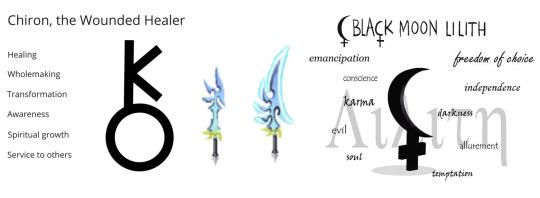
Saix’s weapon Crescent is based on the Phoenix’s wings. This weapon represents the albedo stage of magnum opus. Following the chaos of the nigredo stage, albedo involves the washing away of impurities. In this process, the subject is divided into two opposing principles to be later coagulated to form a unity of opposites during rubedo. The aura is light blue, meaning truthfulness and serenity.
Psychologist Carl Jung equated the albedo stage with “unconscious contrasexual soul images; the anima in men and animus in women”. Jung described the animus as the unconscious masculine side of a woman, and the anima as the unconscious feminine side of a man, with each transcending the personal psyche. This makes albedo a phase where insight into the shadow side of the self is gained, while inflated ego is removed from the psyche.
So, that makes it VERY interesting that the weapon has a similar shape to ⚸. Even if they never planned to actually show it explicitly, the writers seemed to be inspired by Black Moon Lilith. Which raises very disturbing (though very interesting) implications about what happened during the experiments on the “darkness of the heart”. It would certainly explain how Axel’s personality became so warped. It would also explain why he didn’t find Saix’s personality change that unexpected, either, and why Axel seemed to always give him the benefit of the doubt no matter how cold he was.
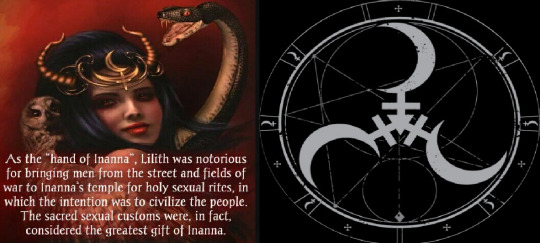
Astronomically, Lilith is considered an asteroid. Yet, some astrologers identify Lilith with the “Black Moon”. It’s the mathematical point that’s exactly in between the earth and the moon–essentially, empty space. Astrologically, it represents the cosmic void; the very energy Black Moon Lilith embodies. Psychologically, it is a point that represents how we react to emptiness and isolation. It brings up deep and primal issues like repressed feelings of rejection, rage, and the refusal to give in. This particular archetype is associated with sex, death, obsession, addiction, transformation, resurrection, magic, the occult and the taboo. These things are seen as the entry way between the spiritual dimension (or the underworld), and life on the physical plane.
Put simply, Lilith is the dark side of the moon. She represents animus, the feminine shadow side—What society rejects as appropriate for the feminine, Lilith takes up. The vilest manifestations of sexuality like pedophilia, rape, and satanic ritual abuse are all the domain of Lilith. She was actually said to be a hermaphrodite, so she could act as both a succubus and an incubus. Trauma based mind-control, through the use of sexual torture is another area connected with Black Moon Lilith. She symbolizes the transformation that occurs after going through a dark night of the soul. Usually, the trigger is great suffering, mourning, pain or torture. I can only imagine what poor Lea and Isa must have gone through.
Astrologically, Chiron (Sagittarius) stands in total opposition to Black Moon Lilith and all she represents. He is a symbol to remind us to look at the vulnerabilities we face in light of our connection to Divinity. Through the exploration of our wounds, we are called to heal all that creates a rift or disconnection with our Spirit.
#kh lea#kh meta#kh isa#kh#kingdom hearts meta#anti-kh3#kh saix#kh 358/2 days#isalea#akusai#kh akusai#kh leaisa#leaisa#kingdom hearts#kh theories#kh axel#kh isalea
59 notes
·
View notes
Text
She-who-fights-and-writes Top 5 Book Recs 2019!!

Here are my top five books/book series that I think EVERYONE should read or at least try to read in their lifetime!! No matter their standing on this list, I love every single one of these books with my whole heart!!!!!
5. Pet Sematary by Stephen King (Genre: Horror)

Back cover:
When Dr. Louis Creed takes a new job and moves his family to the idyllic rural town of Ludlow, Maine, this new beginning seems too good to be true. Despite Ludlow’s tranquility, an undercurrent of danger exists here. Those trucks on the road outside the Creed’s beautiful old home travel by just a little too quickly, for one thing…as is evidenced by the makeshift graveyard in the nearby woods where generations of children have buried their beloved pets. Then there are the warnings to Louis both real and from the depths of his nightmares that he should not venture beyond the borders of this little graveyard where another burial ground lures with seductive promises and ungodly temptations. A blood-chilling truth is hidden there—one more terrifying than death itself, and hideously more powerful. As Louis is about to discover for himself sometimes, dead is better…
I didn’t sleep for two days after finishing this book. I had to read it in the morning, never at night, and couldn’t put it down whenever I picked it up. However, this book is really a testament to Stephen King’s reputation as the dominator of the horror/suspense genre of fiction.
Beautifully descriptive and creepy, it gives a shocking new perspective of the consequences of playing God. With a very much flawed and very much human main character, along with a gripping story that raises the hairs on the back of your neck, Pet Semetary is the perfect book to read when you’re feeling a flare for the supernatural.
4. The Lunar Chronicles by Marissa Meyer (Genre: Sci-Fi)

Back cover of Cinder:
CINDER, a gifted mechanic in New Beijing, is also a cyborg. She's reviled by her stepmother and blamed for her stepsister's sudden illness. But when her life becomes entwined with the handsome Prince Kai's, she finds herself at the centre of a violent struggle between the desires of an evil queen - and a dangerous temptation. Cinder is caught between duty and freedom, loyalty and betrayal. Now she must uncover secrets about her mysterious past in order to protect Earth's future. This is not the fairytale you remember. But it's one you won't forget.
These books broke me out of a serious book hangover (caused by the #1 series on this list) and made me realize “Wait, there are other books in this world that can be enjoyed besides this series.”
Funny and captivating, this book puts an interesting twist on classic fairytales. Instead of being the kind of twist where everything is unnecessarily gory and dark, this puts a futuristic spin on the classic stories that we all know and love.
The characters are amazing and very diverse, and although the stories are similar to the Grimm’s fairy tales, they’re a whole new ballpark plot-wise that keeps you on the edge of your seat!
3. In Order to Live by Yeonmi Park (Genre: Memoir)

Back cover:
“I am most grateful for two things: that I was born in North Korea, and that I escaped from North Korea.”
Still in her early twenties, Yeonmi Park has lived through experiences that few people of any age will ever know--and from which most would never recover. At age thirteen, together with her mother, she made a harrowing escape from brutal conditions in North Korea. Two years later, they reached South Korea and freedom. But the devestating journey in between cost Park her childhood and nearly her life. As she writes, “I convinced myself that a lot of what I had experienced never happened. I taught myself to forget the rest.”
In In Order to Live, Park sines light not just into the darkest corners of life in North Korea, describing the deprivation and deception she endured and that millions of North Korean people continue to endure to this day, but also onto her own most painful and difficult memories. She tells with bravery and dignity for the first time the story of how she and her mother were betrayed and sold into sexual slavery in China and forced to suffer terrible psychological and physical hardship.
Park confronts her past with a startling resilience. In spite of everything, she has never stopped being proud of where she is from, and never stopped striving for a better life. Today she is a human rights activist working determinedly to bring attention to the oppression taking place in her home country. Park’s testimony is rare, edifying, and terribly important, and the story she tells in In Order to Live is heartbreaking and unimaginable but never without hope.
This book changed my life.
Riveting, beautiful, and at heartbreaking, it really made me appreciate what I have in life and made me more aware of things that are currently happening in the world as we speak.
I think that no one should be able to talk about North Korea and about how it’s not a big deal that we help the people there until they read this book.
Truly an amazing and unbelievable story.
2. The Song of Achilles by Madeline Miller (Genre: Fantasy)

Back cover:
Achilles, "the best of all the Greeks," son of the cruel sea goddess Thetis and the legendary king Peleus, is strong, swift, and beautiful— irresistible to all who meet him. Patroclus is an awkward young prince, exiled from his homeland after an act of shocking violence. Brought together by chance, they forge an inseparable bond, despite risking the gods' wrath.
They are trained by the centaur Chiron in the arts of war and medicine, but when word comes that Helen of Sparta has been kidnapped, all the heroes of Greece are called upon to lay siege to Troy in her name. Seduced by the promise of a glorious destiny, Achilles joins their cause, and torn between love and fear for his friend, Patroclus follows. Little do they know that the cruel Fates will test them both as never before and demand a terrible sacrifice.
A phenomenally written and emotional re-telling of the classic Greek epic the Iliad that delves into the romantic relationship between Achilles and Patroclus.
Madeline Miller truly has an undeniable god-given talent for writing; her descriptions and storytelling makes for a book that you CANNOT put down once you’ve picked it up.
I read this book in a day and had a serious, serious book hangover afterward; I literally could NOT stop thinking about it for days. It just sticks with you, you know?
Me and my mom both wept over this book; it is truly a triumph and a masterpiece.
1. The Grishaverse by Leigh Bardugo (Genre: Fantasy)


Back cover of Shadow and Bone, first book in The Grisha Trilogy:
Soldier. Summoner. Saint. Orphaned and expendable, Alina Starkov is a soldier who knows she may not survive her first trek across the Shadow Fold―a swath of unnatural darkness crawling with monsters. But when her regiment is attacked, Alina unleashes dormant magic not even she knew she possessed.
Now Alina will enter a lavish world of royalty and intrigue as she trains with the Grisha, her country’s magical military elite―and falls under the spell of their notorious leader, the Darkling. He believes Alina can summon a force capable of destroying the Shadow Fold and reuniting their war-ravaged country, but only if she can master her untamed gift.
As the threat to the kingdom mounts and Alina unlocks the secrets of her past, she will make a dangerous discovery that could threaten all she loves and the very future of a nation.
Welcome to Ravka . . . a world of science and superstition where nothing is what it seems.
Back cover of Six of Crows, first book in the Six of Crows Duology:
Ketterdam: a bustling hub of international trade where anything can be had for the right price―and no one knows that better than criminal prodigy Kaz Brekker. Kaz is offered a chance at a deadly heist that could make him rich beyond his wildest dreams. But he can't pull it off alone. . . .
A convict with a thirst for revenge. A sharpshooter who can't walk away from a wager. A runaway with a privileged past. A spy known as the Wraith. A Heartrender using her magic to survive the slums. A thief with a gift for unlikely escapes.
Six dangerous outcasts. One impossible heist. Kaz's crew is the only thing that might stand between the world and destruction―if they don't kill each other first.
The Grishaverse is a group of series that are all set within the same universe where magic runs wild and the world-building-- from the culture of each country to the unique landscapes--is so phenomenal that you almost wish you could jump right into the book like Blue’s Clues and live there forever.
Leigh Bardugo is my favorite author of all time.
Her writing is beyond any other tier that I have every had the pleasure to read, to the point where I couldn’t read any other books for a good year after finishing the Six of Crows Duology because it set my standards so high for YA fantasy.
There are many books within the Grishaverse-- including the Grisha Trilogy, the Six of Crows Duology, the King of Scars series, and the Language of Thorns storybook--but you don’t have to have read one series to understand the other.
Personally, I like the Six of Crows Duology better than the Grisha Trilogy; it was written afterward and the writing and storytelling is far more evolved and sophisticated.
But even so, Leigh Bardugo really is an incredible storyteller, so if you can get your hands on any of these books, please do!
56 notes
·
View notes
Text
Wang Zhenyi
Who: 王貞儀 (Wáng Zhēnyí)
What: Scientist, Mathematician, and Poet
Where: Chinese (Active in China)
When: 1768–1797

(image description: unfortunately there don't seem to be any portraits of Wang, but I don't think that was uncommon of the era. Instead this is a near contemporaneous portrait of a court woman. It was part of a series of 12 screen portraits commissioned by Prince Yongzheng to hang on the walls of his study, much like a proto-Farrah Fawcett poster. It was very hard to find portraiture from the 18th century of anyone who was not royalty so this had to do. The subject is of high status/wealth [higher than Wang was] but roughly equitable. Very roughly. Anyway. It shows a young East Asian woman smiling serenely, maybe a little coyly at the viewer. She is in a study of some kind, seated at a desk and reading a book. She has the cover folded back like one might do with a paperback novel today. She is wearing the complicated many layered dress/robe standard of women of that era in green, white, and pink. Her long black hair is partly pinned up.)
Wang's contributions to astronomy and mathematical education are innumerable and of incredible importance. However she was also a poet and a proto-feminist.
It is extremely tragic that Wang has been nearly forgotten in the present. Unfortunately most of her scientific writing has been lost, but her influence is indisputable. She was the child of noted and prestigious academics in a place and time where that meant high social standing. Despite being something close to an aristocrat she was highly opposed to the class inequality she saw in her travels and the sexist traditions at the time. She broke all molds and her poetry included lines like
"Village is empty of cooking smoke,
Rich families let grains stored decay;
In wormwood strewed pitiful starved bodies,
Greedy officials yet push farm levying"
And
"Are you not convinced,
Daughters can also be heroic?"
Her work in astronomy pushed Chinese astronomy forward and her contribution to mathematics made the field more accessible to a wider audience. Wang was able to explain some celestial phenomenon that up until that point was not understood, like equinoxes and eclipses. Her most famous experiment/demonstration was to prove how the earth, sun, and moon acted together to create eclipses. In a garden pavillion she set up a round table (the earth), hung a lamp from the beams (the sun) and to one side had a small round mirror (the moon), moving these objects around she was able to prove her theory about the formation of lunar eclipses was possible (it was correct, incidentally). She came up with her own argument for gravity and mapped out the movement of planets and the placement of stars. Her largest contribution to mathematics was taking the work of a Chinese mathematician she admired and making it more easily understood. The book in question was Mei Wending's Principles of Calculation which inspired her work The Simple Principles of Calculation.
Most impressively she was nearly entirely self taught and did all of this before her untimely death at 29. Her notable works (beyond The Simple Principles…) include The Explanation of the Pythagorean Theorem and Trigonometry, Dispute of Longitude and Stars, The Explanation of a Lunar Eclipse, and The Explanation of a Solar Eclipse.
A Venusian crater now bares her name.
Probable Orientation: Asexual (romantic orientation is harder to determine in a culture that really held very little regard for the notion of romantic love in relationships.)
This is another one where I am showing my personal interests. I find the culture and history of China fascinating and Wang's life is extremely incongruous to her place and time.
Wang lived in the early Qing Dynasty. Women were not exactly highly valued and marriage/family held a very specific and very important place in Chinese culture. Wang never had children and she didn't marry until she was 25. Here is why that is a big deal.
There were very specific traditions surrounding marriage and children in much of Chinese history. Family structures were patrilinear to an extreme degree. It was understood that daughters did not belong to their birth families, but the families they married into. They had no place in their natal families. Marriage was crucial if you wanted a place to be loved and remembered. Having children was likewise important, often the closest bonds were between mothers and their children (particularly sons), and having children was a requirement on a larger human scale. You had a specific role: continue the family line, uphold family honor. All people are a link in a larger chain from the beginning of time. Romantic love was unimportant, marriage and sex were an undeniable obligation. One of the central tenets of two of the three major Chinese cultural/religious traditions* is Filial Piety (孝, xiào): dedication to, respect for, and ensuring the continuation of your family.
There is a more selfish and personal level, children were the only way you could assure you would be cared for in old age and in the afterlife. Just as you were required to care for your parents/parents-in-law as they aged, so too were your children required to take care of you. In old age you would always be provided for...and into the afterlife. The Chinese dead had to be exhalted, remembered, and provided for. Your ancestors were important members of your family. If you weren't remembered and didn't get provided for you would go hungry and become homeless, helplessly and hopelessly wandering the earth for the rest of eternity.
If a woman died unmarried she was not part of an ancestoral line. She did not belong anywhere. She would not be remembered. That was often why there would be ghost marriages (冥婚, mínghūn) for women/girls who died unwed, so she had some hope of being provided for.
If you were a perceived as a woman your entire purpose was in the home: you married, you provided for your husband, you had and educated children. The idea of a woman having an external life was completely unheard of. Indeed even today in parts of China, the idea of a woman wanting to stay unmarried is seen as a symptom of underlying mental illness (although that's fairly true everywhere). After all, no one wanted to be responsible for ending a family line, disrespecting their ancestors, potentially damning themselves to poverty, and absolutely damning themselves to becoming a restless spirit after death.
Usually in Wang's era in the middle of the Qing Dynasty a Han Chinese woman would be married off between 16 and 18. Often the younger the better because, again, if she died while unmarried she had no family to mourn her, and no one wanted that to happen to their children.
By contrast at 16 Wang began to study science and traveled, leaving home. Maybe even to escape this fate.
What I am trying to make clear is what Wang did was unheard of. Becoming a scientist rather than getting married would not be a Girl Power move, this was not only spitting in the faces of her entire family line, it was rejecting the only culture she had ever known, and literally screwing over her immortal soul.
As stated Wang did eventually marry at age 25. That was an extremely old maid, especially when you consider this is the 18th century when death was often sudden and unexpected, be it from illness or something more sinister on unsupervised roads.
Further, when Wang died four years after marriage she was still childless. Not only does this go against Filial Piety, it was also a hard thing to do at this point in Chinese history. Every member of her and her husband's family would expect her to have (male) babies and be pushing for it to happen. Indeed childless women were often treated by poorly especially by their mothers-in-law.
My thought is her choices went beyond rebellion (by all accounts she had no complaints with her family, her father was a well regarded doctor). Her life path goes beyond being simply unusual...it is downright queer. So my thought was she was so put off by the idea of marriage and so in love with her studies (like Rosalind Franklin, Carter G. Woodson, Jeanette Rankin, Florance Nightingale and so many other aces) that she substituted one for the other. Eventually, given the pressures of the time, she relented and married, probably making everyone in her family breathe a sigh of relief. But the union never producing a child leads me to believe she rarely, if ever, relented to consummation.
*Confucianism and Chinese Buddhism (the third is Taoism which is less concerned with this).

(image description: a drawing from Sam Miggs's Wonder Women. It is a simple drawing of Wang performing her eclipse experiment. End ID.)
24 notes
·
View notes
Text
Something about property rights
I felt like I needed to rant yesterday and decided to adapt the discord messages into a tumblr post.
I spent most of a class this morning thinking about the Anglo interpretations and notions of property rights, trying to actually contrast it with workable alternative notions of property rights and feeling kind of hopeless about it and finding it hard to actually come up with anything that isn't literally communism.
And in retrospect it made the whole “philosophically questioning the whole notion of property rights” feel more, idk, respectable than it had before, when it just sounded like the USSR and China opposed its inclusion in the UDHR for technical reasons or pure self interest in covering their own atrocities.
The whole thing started with thinking about the Zapatist slogan “la tierra es de quién la trabaja”. “The land belongs to those who work it.” To me, the Zapatistas were pretty cool guys, who sided with the little guy and the indigenous peoples of México. But I thought immediately about how a colonial American might react to it, and I couldn’t escape the idea that they’d hear the slogan and go, “ah, yes, we should kill the savages and steward the land correctly”.
As much as the magna carta is held up as this great precursor to democratic rights in this country, its origins are far more dismal and petty. It wasn’t really a democratic impulse, it was more like a bunch of petty-kings coordinated to overwhelm a high king. But it doubtlessly had a strong effect on feudalism and came to be a part of English identity before that even really made sense from a modern perspective. In short it came off almost as a promise that “every man is a king of his own home” and that helped to make property itself sacrosanct.
So when capitalism changed the people’s relationship with the land, the serfs were “liberated” as the commons were siezed by their de jure owners. The collapse of the commons fundamentally changed people’s relationships with property, exacerbating the whole “every man is a king of his own house” issue, and making property the be-all-end-all of basic needs like shelter. To the degree that the Magna Carta made property sacrosanct, in a literal “this is a divinely appointed right” sort of sense, the collapse of the commons codified exactly what that meant, making that sacrosanctity intrinsic to thriving.
So because of tying these issues together so deeply, it made sense to steal the lands of people “not working it” according to how you might work it. So that it made sense to go to war because the yankees were stealing your chattel, and horror of horrors not even repurposing them! So that telling South Africa “hey, no, black people are people too” was unholy, violating their sacred authority to clean their own house. So it makes sense that Australia continues to break promises to its Aboriginal communities, if, say, their homes have a potentially profitable mine to work. So it makes sense that Canada breaks promises to its indigenous population, if there’s an oil pipeline they can lay. So that it made sense, paradoxically, for the US to strong arm México into changing articles of its constitution about indigenous land rights in order to pass NAFTA and be able to threaten to go United Fruit Company on the people for not being profitable to the corporations. And the EZLN, which formed directly because of the anxieties of these moves as the Maya genocide was still very fresh on everyone’s minds, are neo-Zapatistas; the land belongs to the one who works it! The Maya who always has, or the companies that want to (exploit it)?
I remember once as a teen confronting the attitudes this bears on a small chan.
Before the BLM stuff, actually regarding OWS and those "rich punks arguing for socialism with their iphones" and shit; I'd made an off hand comment about things not being worth more than lives at some point and someone replied "I'd totally kill someone if they stole my phone".
I made a comment in utter exasperation (this was on a board that was like /pol/ before that was really what it is now and there was no reason to believe they weren't serious), saying something like "Is, what, a month's pay really worth a human life to you?" ($800 really was more money than my mom was making at the time, let alone taking out rent and shit first, and I gave them benefit of the doubt that they weren't rich first world fucks who could afford to take a hit. At that point I’d learned that most people in India, even dirt poor people who couldn’t afford water, generally had smart phones in order to help with work and things; conscientious of this, the fact that I know and knew dirt poor almost homeless people in the US who needed phones for work, I was trying to allow for “if I lose this phone, I lose my job, my home, my health, and my life” which is a reality a lot of people live with, and at least somewhere to come at this issue with).
(But) the commentators, both the user I was arguing against and several people using trips, proceeded to mock me for apparently living in a 3rd world country for thinking a phone cost more than one paycheck.
To these people a phone wasn’t even worth a week’s pay, let alone two. And yet, to them, another person’s life, no matter how desperate they were, no matter how hungry or sick or anything they were, they were worth less than that.
This exchange was about the time I started nurturing (or giving in, depending on your perspective) the idea that "maybe some people aren't just, mistaken, or seeing something I don't, or have some complex network of beliefs making them bite a bullet, but like, actually goddamn legitimately evil in terms of their fundamental values". I gather absolutely that there’s a lot going on with this; that you could understand the guy to mean “I think thieves should be killed” as opposed to ““humans”“ or whatever. But, like, still.
Traumatizing is an overly dramatic word for what that conversation all those years did to me, but maybe it was. And it’s not like a phone’s *nothing*. But the way the users undercut me, and revealed not only how worthless the phone was to them, but how little human lives were worth to them in relation to the phone just kind of knocked the wind out of me
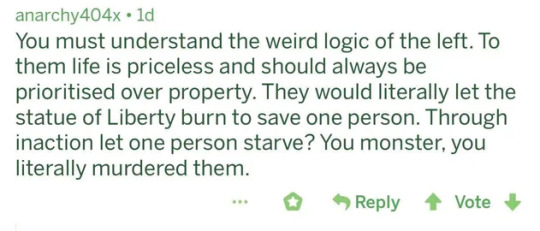
This made the rounds recently. This is the legacy of that property is sacrosanct bullshit.
And, like, fuck, this is the whole cultural underpinning of what’s been going on with the gun shit here. It’s why guns are so important to us. Why we feel it’s absolutely justified to shoot a kid in the back for lifting a $2 bottle of beer from a convenience store and leaving him to bleed to death without so much as calling the police. The entire fucked up thing we got going on w/r/t race here in the land of the free? It’s because of our relationship to property rights.
At the same time, you get climate change from people who feel it’s their right to do whatever to their property. Oil’s money. Dairy farms, meat, cash crops like almonds. You don’t like your water dirtied? But I’m only fracking over ma plotte!
What’s going on in Brazil? Some natives won the right to their lands against farmers who wanted to clear the forest, and mysteriously within a few weeks everything’s lit on fire. 𝅘𝅥 Dark torrents shake the airs, as black clouds blind [São Paulo] ♫
You even get the nimby zoning shit out of this. How dare you let colored people into my neighborhood! That’s stealing from my property values! A tall building? That’s stealing my sunlight!
In a more mixed sort of way, you got homeless shelters, oil wells, chemical plants, industrial parks, military bases, fracking, wind turbines, desalination plants, landfill sites, incinerators, power plants, quarries, prisons, pubs, adult entertainment clubs, concert venues, firearms dealers, mobile phone masts, electricity pylons, abortion clinics, children's homes, nursing homes, youth hostels, sports stadiums, shopping malls, retail parks, railways, roads, airports, seaports, nuclear waste repositories, storage for weapons of mass destruction, cannabis dispensaries, recreational cannabis shops and the accommodation of persons applying for asylum, refugees, and displaced persons - a list i just lifted from wikipedia’s articles on nimbies. Looking at that, there’s some clearly sympathetic issues too. I mean do you really want a train cutting through your farm, no matter how well you’re recompensated, no matter how much it will objectively improve the lives of the people in the cities, no matter much better it is for the environment to commute together?
But, like, what exactly are the alternatives?
We could look at other cultures. What did Belgian property notions look like? Leopold of the Congo? What do French notions look like? Forcing Algieria to pay back the “investment” France made by colonizing them? Well, the English and the French go back a long, long ways, maybe we could look at Germany?
The first genocide of the 20th century is often recognized to be that of the Herero, in Namibia’s, Germany’s biggest steal in the struggle to carve up Africa like the Black Dahlia.
I already mentioned Brasil.
What about China? Surely they aren’t western!
By some notions they were the first feudal nation in the world, and yet only left the system really in the 20th century. That’s a lot of cultural baggage that underlays the reality the Chinese live under today.
The early republican period saw the rise of warlords and other petty bastards effectively continuing the feudal reality in much the way sharecropping and jim crow continued chattel slavery in the US. The successor states aren’t pretty either; Taiwan, continuing republican ideals, cleared out much of its indigenous population for the Han in ways analogous to what European powers did to the natives of their countries; the PRC, which was born to challenge the ideals of the old republic for its own, took back “what was theirs” with Tibet.
The PRC, explicitly rejecting property rights as the west understands it, doesn’t even have a legal analog to eminent domain, and in effect can seize property on a whim without compensation, forcibly engaging in actions like people moving, which I feel it should be known when done to a community often results in genocide.
Something else illustrative of the conflicts of interest in the problem lies with the 3 Gorges Dam project. Ostensibly to control flooding to villages downstream, over a million residents of the Chongqing area were forcibly relocated, with rumors of people who resisted the project being explicitly drowned and because everything’s just hopelessly corrupt the money actually provided for recompensation never made it to the hands of farmers now stuck in a big city without the education for work.
Similar stories to Taiwan’s play out in other capitalist countries; similar stories to the PRC’s play out in countries that reject those notions.
Generally you just reinvent the same concepts drawing from the lord and serf mentalities of old. There’s shit like this going down in the Muslim world, in East Africa, South America, South Asia, whereever. It’s not just an Anglo thing, even though I’ve let myself believe it were, because of how I was taught about history, from my culture’s perspective.
Then you have to ask yourself, when there’s no net, when you have to provide for yourself first, do the commons necessarily make sense?
Is it even viable, economically or politically, to abolish private property and return to the commons like people have advanced? Would, to enjoy the benefits of something evidentally only stable under feudalism, we have to return to some kind of practice of feudalism? Is that even worth considering?
There are more people alive today than ever before. And that didn’t happen just by accident. We really, actually, seriously have made incredible improvements to agricultural yield and safety, ensuring that the only places on the planet that starve are those that are being starved, by monsters like the Saudis. But the scale we need, the scale we want, the scale we have - is much more than just what one farmer can provide for himself. And the fact that we do have other farmers do the mass farming with their bulk fertilizers, machinery, pesticides, and such, means that most of us don’t have to spend time every week tending to our gardens making sure we have enough staple foods to survive, so we can pursue our own hopes and hobbies and dreams and undertakings and services and so on.
All of it sort of leads to the question, Who deserves the land?
The worker whose blood sweat and tears are wrought into the soil? That could lead to the issue of killing my Yokuts friends' gatherer ancestors for stewarding their lands, husbanding their ecosystem and managing burns and wild populations, instead of raping the lands, burning everything to ash to farm foreign crops that aren’t even adapted to the water issues here. And it doesn't proclude the workers from choking us with smoke, if they feel they need to. The guy on the oil rig isn’t doing it because he endorses what the oil companies do or because he thinks it’s necessarily a good thing, he does it because it makes him bread. Why would worker’s self management solve that? Shareholders and workers alike would only care about taking home what they can.
The "owners” in the English sense? Taking subsidy after subsidy, fighting actively to drain our rivers, collapse the formerly self-renewing resources entirely, bringing us droughts, feeding even the lactose intolerant among us the lie that we need fatty heart clogging cheeses to be healthy? Illegally hiring, exploiting, and deporting the vulnerable? Big farms are just any other business, their owners are the same venture capitalist vultures preying on anything else in that world. South of me used to one of the biggest lakes in North America, virtually the entire south valley was lake Tulare. It’s a bunch of cities now.
So, the people who need it?
Maybe but who decides that? War for territory is a fundamental struggle built deep into us; war is even practiced by chimps. Military ration planning like we saw in the USSR and PRC cause Holodomors. United Fruit and their entire coalition caused the Silent Genocide. Abolishing private property entirely would, what, return us to the times when the lands were unclaimed? That would just lead to petty struggle after petty struggle, like a chimp disemboweling another.
And now, having written this a second time, I’ll end with what I wrote earlier

4 notes
·
View notes
Link
There’s an old saying, that Paris would be lovely without the Parisians. I don’t actually agree with that. They can be a bit arrogant, sure, but on the whole I find Parisian men quite civil and Parisian women classy and sexy. So I hope they stay.
There is one place though where that saying absolutely fits. Hong Kong. HK is a very cool city. It is a first world city built on a landscape of high tropical mountains, and you can see how the force of modern industry has made humans conquer the environment, fitting skyscrapers into the mountain bedrock and open-air escalators to reach them with ease.
…
So what’s going on in Hong Kong? A massive riot sponsored and organized by the United States Government, that’s what’s happening. What we call a “color revolution”. Funds by USG’s National Endowment for Democracy have been revealed, US diplomatic staff have been found organizing the rioters, and the whole mass of Western journalists (i.e. half the Cathedral) have been pushing the most egregious propaganda for weeks. There’s nothing special, nothing unique about this. Color revolutions aren’t new. This isn’t the first one, and won’t be the last one. The day Germany grows a pair and starts to push back against US meddling in European politics, rest assured that Berlin will burn for weeks under a massive Antifa riot lionized by the US press.
That said, the US isn’t that powerful. Not that generous; the money USG is sending around isn’t enough to motivate every single rioter to get out of home. USG isn’t stupid and it only pulls the trigger in places where the powder is already plentiful and ready to burn. It needs a fifth column of people willing to burn it all, a place where people hate the status quo so much they’d rather sell their country to USG. Hong Kong is indeed such a place.
…
How did that happen? To put it briefly, Hong Kongers think they are a superior people to the rest of China, and to the bottom of their hearts hate being ruled by Beijing. This isn’t about Communism or muh Freedom or muh Human Rights. This is a basic, deep problem of self-perceived social status. As I’ve said again and again, 90% of human concerns are about social status. Hong Kongers think China is low-status and hate every association with it. On the flip side, Hong Kongers think that Japan is high status. Also England. Well, the Anglosphere as a whole. So they revel in associating with it. Hong Kongers will spend 2,000 dollars to get on a plane on a Friday evening to fly 5 hours to Japan and spend the weekend there eating lame high-carb food and buying cosmetics that don’t really work just to be able to go back and say they’ve been to Japan again. That’s on Hong Kong where work hours are long and leisure time very precious. But that’s just part of the culture.
Why do HK people think China is so low status? Well because for a long time, and for a critical time period in Hong Kong history, the time period where Hong Kong’s population stabilised and its culture took form, China was indeed a poor shithole of peasants who shat in the street and were ruled by a bunch of retarded communists. Societies are just an aggregation of people, and people are dumb and stubborn. Memories taken as a child get fixed as culture, and are almost impossible to update after adulthood. Hong Kong collectively grew up being somewhat understandably disgusted by China’s backwardness. That all that is 40 years in the past and Chinese living standards in most cities are by now higher than in Hong Kong just doesn’t register to them. They just won’t admit it, the same way old men never admit their experiences just aren’t relevant anymore. Things never change if that change results in lower status to oneself. That’s how human brains operate. Scale that to a whole society and it can be brutal.
…
Hong Kong exists because the Hong Kong economy exists, and that exists because as China went communist, Hong Kong was the only sizeable place with a decent commercially-minded government and a land border with China. Hong Kong was the middleman for making business in China, and as China opened up and developed, the economic rationale for Hong Kong slowly eroded. Again, starting salaries for college grads in Hong Kong are already lower than in the richest cities in China. Hong Kongers aren’t superior anymore, by any metric. The city is decaying, little by little, and there’s nothing unnatural about that. Urban economies rise and fall, that’s just a normal result of economic cycles. Happens all the time in every country.
In normal circumstances when a city’s economy starts to falter, young people just pack up and leave for growing cities. But HKers won’t do that. They may leave the country, move to the Anglosphere if they have a chance (not to Japan, that’s only suitable for LARPing in the weekends, the language is too hard), but the vast majority of HKers would hang themselves in the nearest lamp post before considering the logical option of just packing up and moving to Dongguan. Why? Because China is low status, and they are high status. Why? Because it has always been like that, Mommy and Granny told them so. So they will stay, and complain endlessly about why HK isn’t as rich as they believe they’re entitled to be. A life is not worth living if you can’t live in a 50sqm apartment and hire a Filipina to clean it because you’re too busy commuting to your corporate lawyer secretary job.
…
It’s quite the sight to see to what insane lengths Hong Kongers go to slander China and make it public that they just won’t be associated with it. This in a city where the majority of population moved from China barely 50 years ago! See this Hong Kong “scholar” arguing that China is a cannibalistic culture, where eating human meat was just part of the usual savagery of life. Nothing to do with Hong Kong themselves, of course; the light of British enlightenment and bastardized Christianity (you really gotta check out local Christians for yourself, it’s hilarious) has purified them of all that yellow savagery.
But the Hong Kong riots have a deeper lesson than just how evil people can become when they want to, how a basic sense of honesty and decency go down the drain when a movement is allowed to be captured by its left-wing of sociopathic status maximizers. The deeper lesson here is about the Patchwork, this old libertarian concept about competitive governance inherited by neoreaction. The idea that bad government is the result of a lack of competition, that countries today are overall too large, and an ideal world would have city-state sized countries experimenting with different types of government and culture, and having them compete to develop the most effective ways of managing human affairs.
…
A patchwork city who is underperforming economically compared to some neighbouring city isn’t just going to copy whatever government structures or cultural practices of a richer neighbour. Most likely it will just come up with some lame rationalization about how their backwardness is actually just a sign of their superior status, and before changing a iota of its own habits, will rather go to war with the richer city for having the audacity of not accepting the poor city’s cultural superiority. That’s just what humans do. That’s exactly what all the Greek polis did until they were invaded and thrown to the dustbin of history by Macedon and Rome.
…
Do the nations of the earth have a right to preserve their own culture? Many antiglobalists would instinctually answer “yes”. But the proper answer to that question is that there’s no such thing as “rights”. Some cultures are good, some cultures are bad; some nations make sense, some nations just don’t have the means to subsist, and so won’t, and should be allowed to dissolve, instead of insisting on keeping everything alive artificially, making the world a ethnic group zoo where every single distinct culture which existed at the end of World War 2 must be preserved as part of the American project to freeze everything at the moment where its power was at its peak.
What is a “nation” anyway? What is a “people”? The usual attributes are easy to spot: common language and folklore, self-perceived status as a unit distinct to its neighbors. But all those attributes didn’t come out of thin air. They evolved over time, and they evolved because they worked in their particular historical environment. If perceiving yourself as a distinct nation implied your annihilation after a few weeks, like, say, in the case of a Mongol subtribe under the rule of the Khans, or a small fief close to the Kingdom of France, well odds are you aren’t going to perceive yourself as a distinct nation, because the moment you do you get invaded and destroyed. If national status gets you money, women, and lionized in the international press as a Champion of Liberty, well odds are that the among the most impressionable people on earth, i.e. young men and women, who the West has the retarded habit of assembling daily in these places we call Universities, are going to feel like a nation very very fast.
…
Is China going to destroy Hong Kong the way France destroyed all its regional cultures? Not outright, that’s not how the Communist Party of China does things. The CPC are real believers in materialism. They really think that Uyghurs for example go into Islamism because their poor, and the day they’re lifted out of poverty (through education, of course. The blind belief in Education is the one thing that the West learned from Confucians and then re-exported as one of the main tenets of Progressivism) they’ll just become deracinated hedonists like everyone else. The propaganda line about Hong Kong right now is that a lack of economic opportunity for young Hong Kongese, in addition to outright mobilization by the United States of the worst thugs and lowlifes in the city, is behind the riots. Which is completely missing the point. No amount of money is going to change the deeply engrained feeling of status superiority of the HKese towards China. It would only make it worse. The same way that more money would make Muslims even more arrogant and violent towards outsiders. The comparison with Muslims really is apt. Two million Hong Kong citizens demonstrated against the extradition bill. It doesn’t mean that two million people participated in the violent riots, the beatings of police and dissenting citizens, the physical wrecking of roads, the blockage of the airport. But they won’t condemn it either. “These kids are just too hot headed but their heart is in the right place”. The sort of thing that your average Muslim says about Al Qaeda.
…
It’s funny that Progressivism holds racism as the supreme evil, and yet spares no effort in supporting provincialism and ethnic chauvinism, which are basically the same primal xenophobic instinct, but applied in a narrower and much more irrational way. Races after all do differ in behavior in much larger ways than neighboring ethnic groups. But that’s how Bioleninism works: you’re allowed, even encouraged to hate your family, especially your smarter and more productive relations. What you’re not allowed is to hate complete strangers, especially the nastiest and most hostile ones.
3 notes
·
View notes